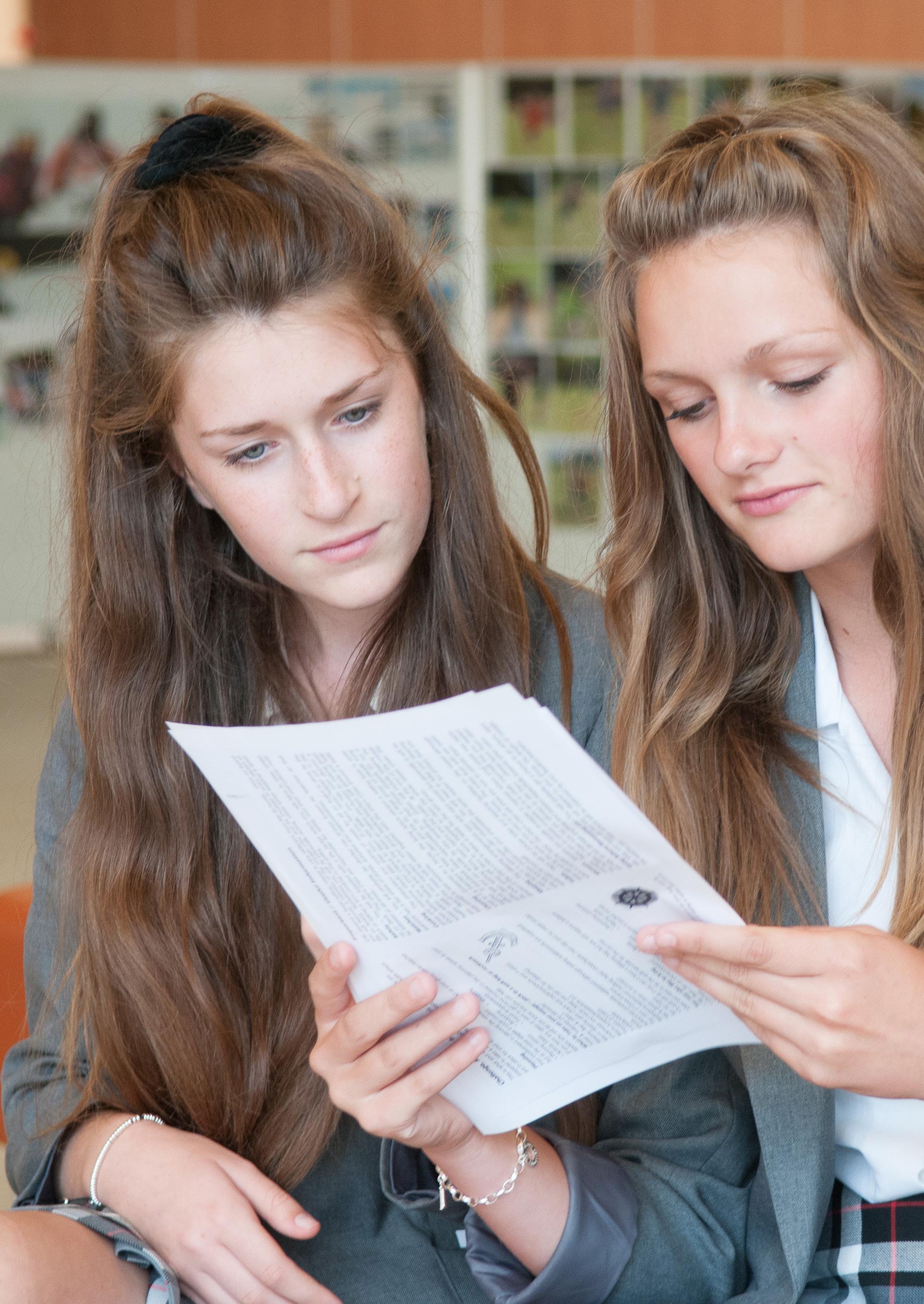Year 9 Curriculum information booklet
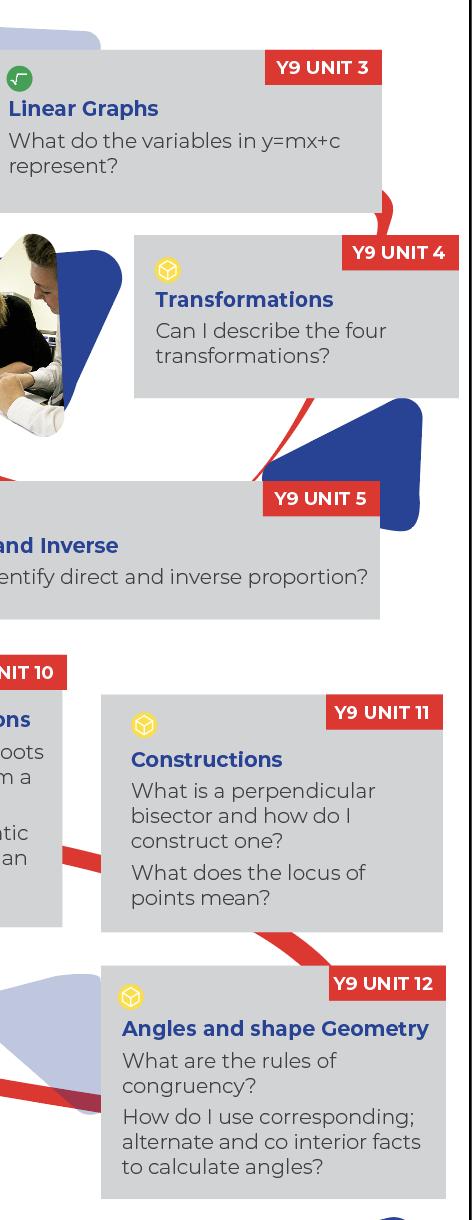
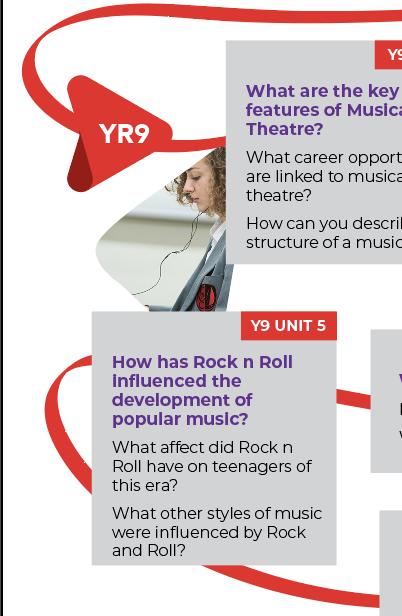
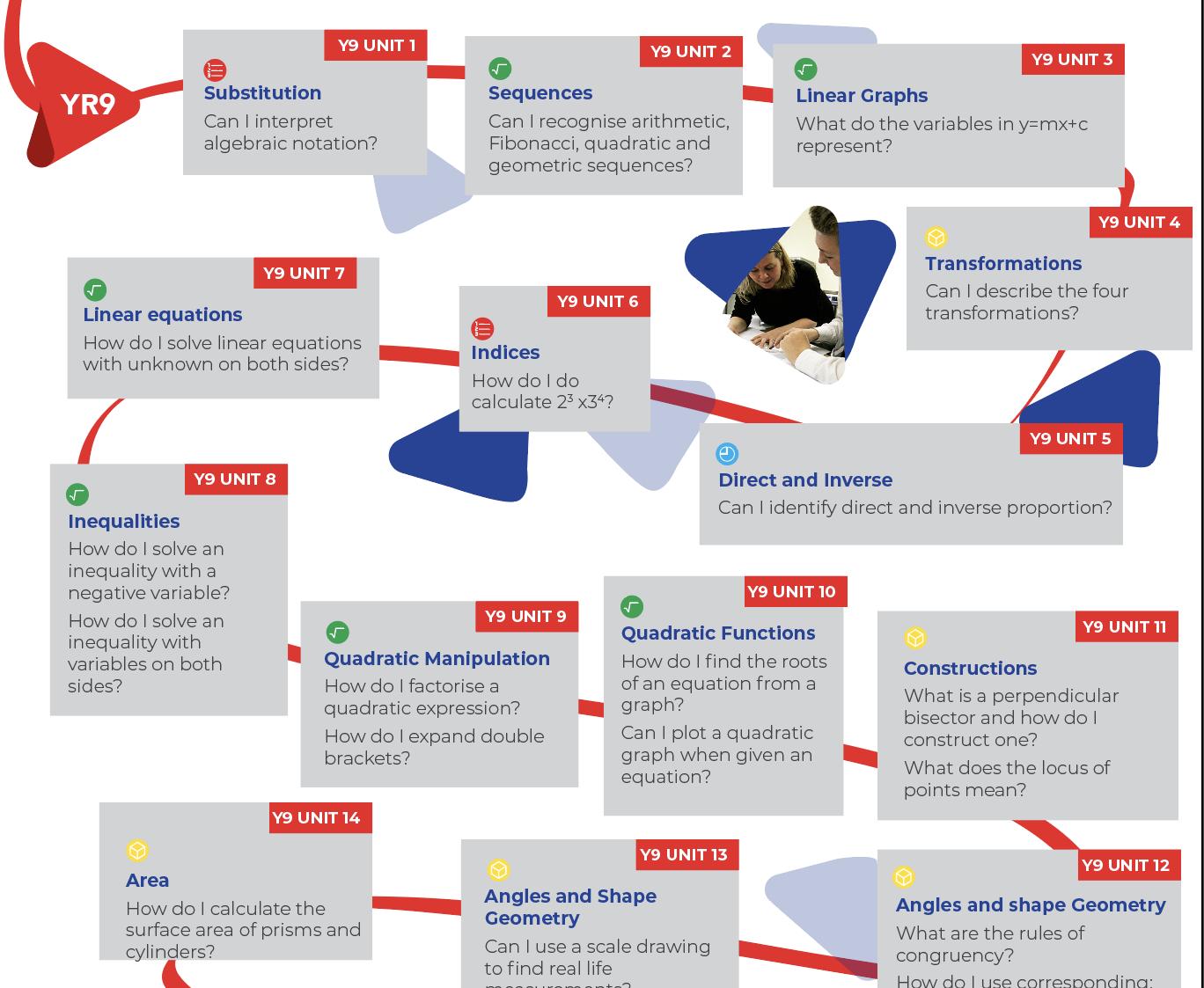
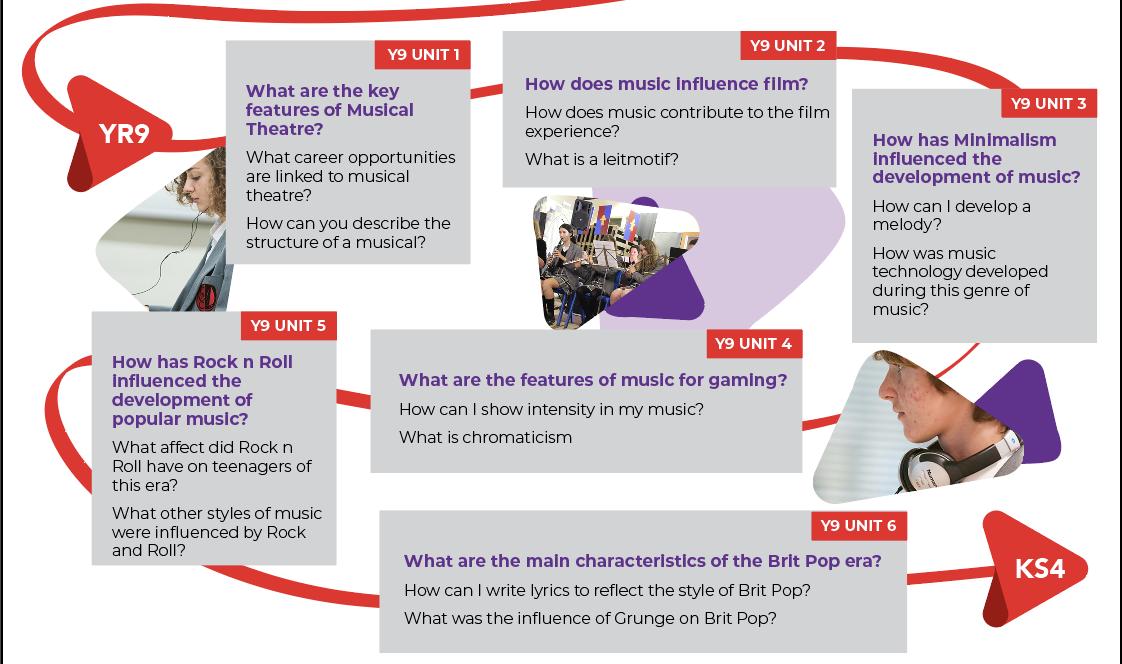
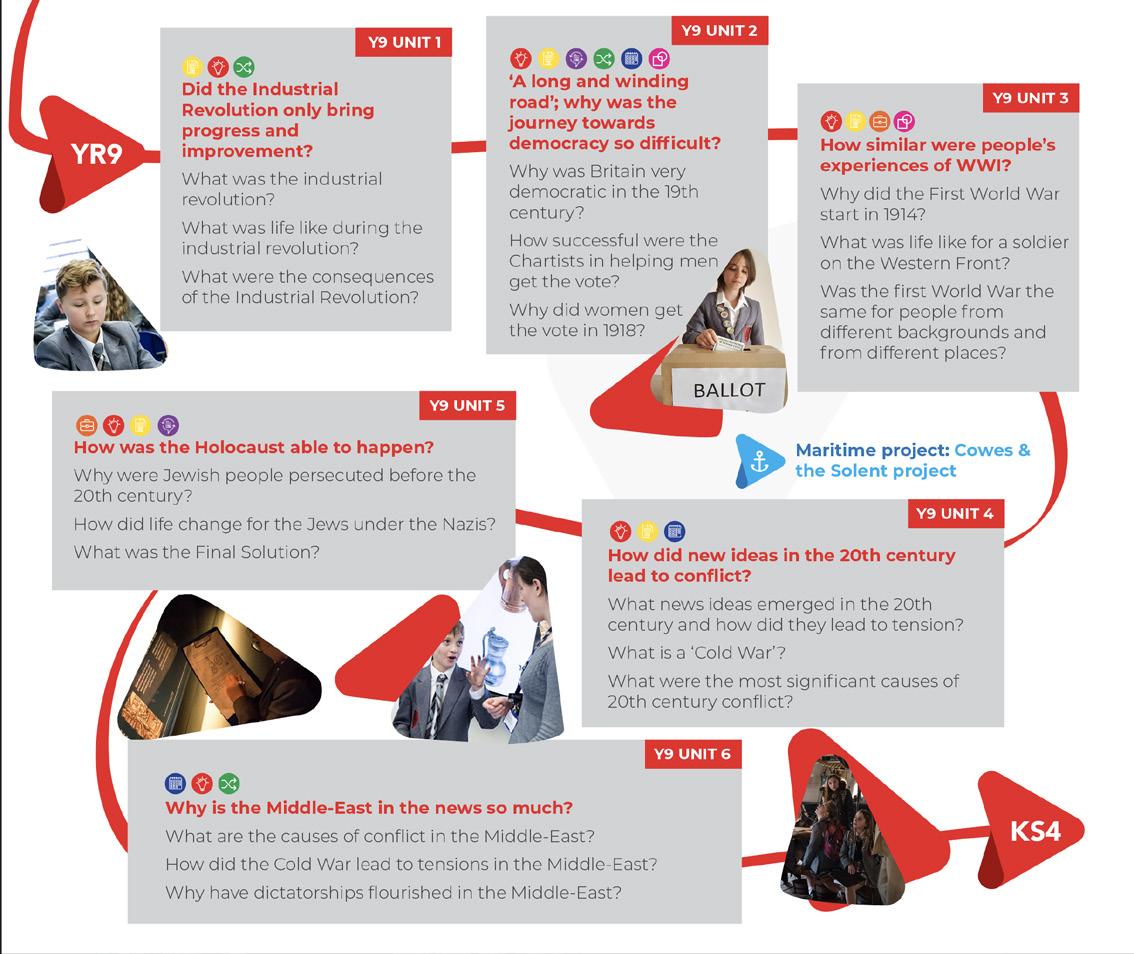
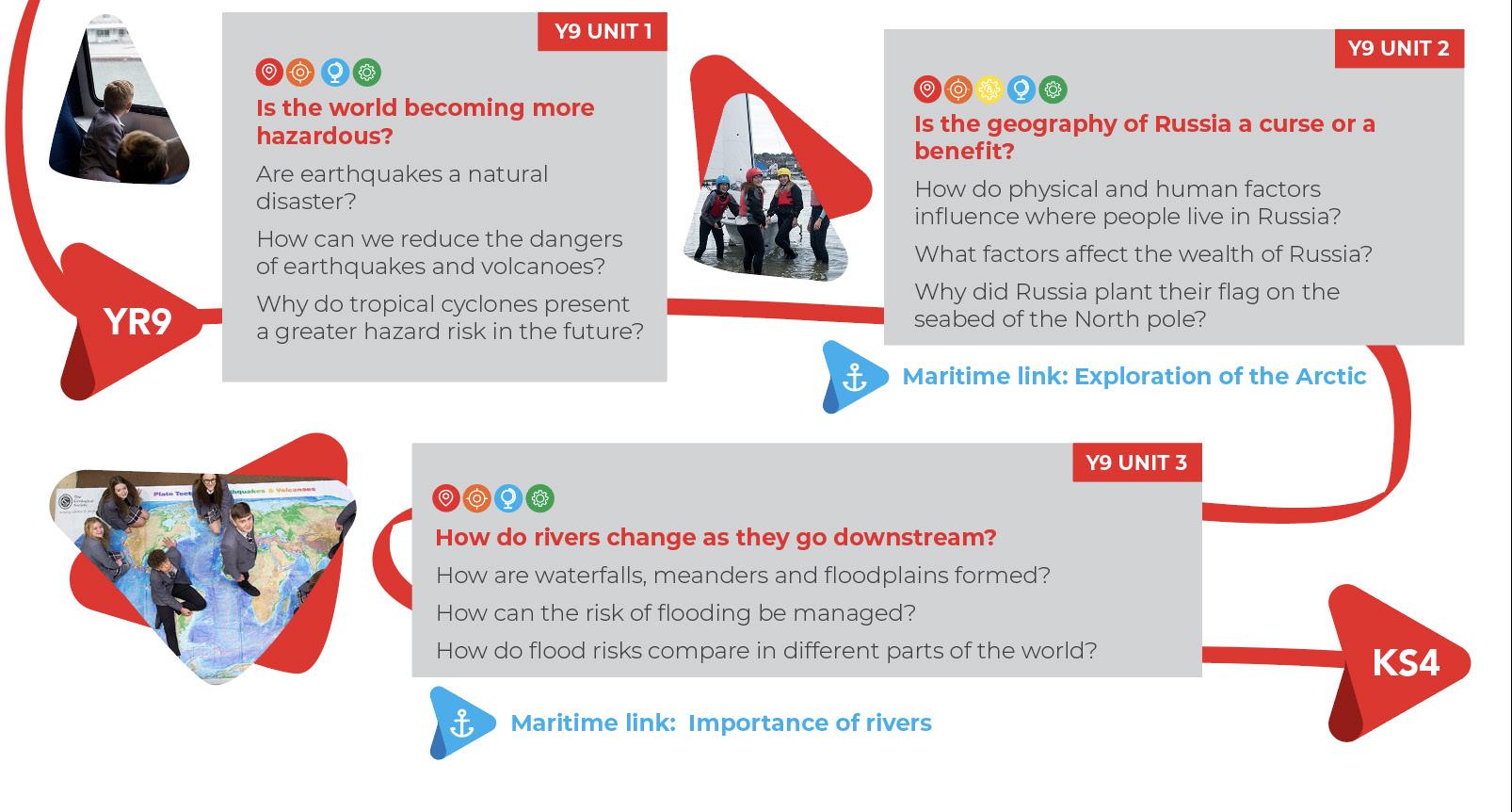
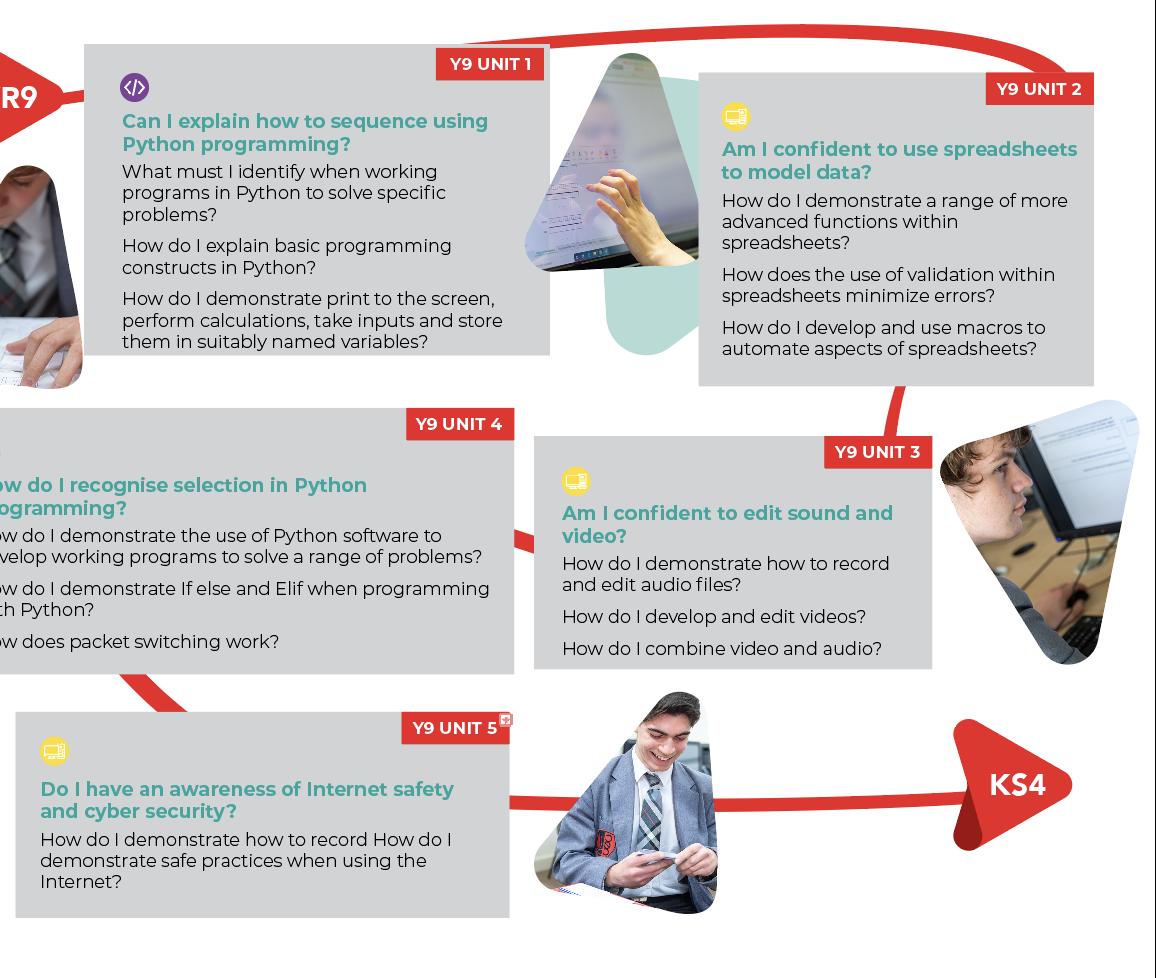
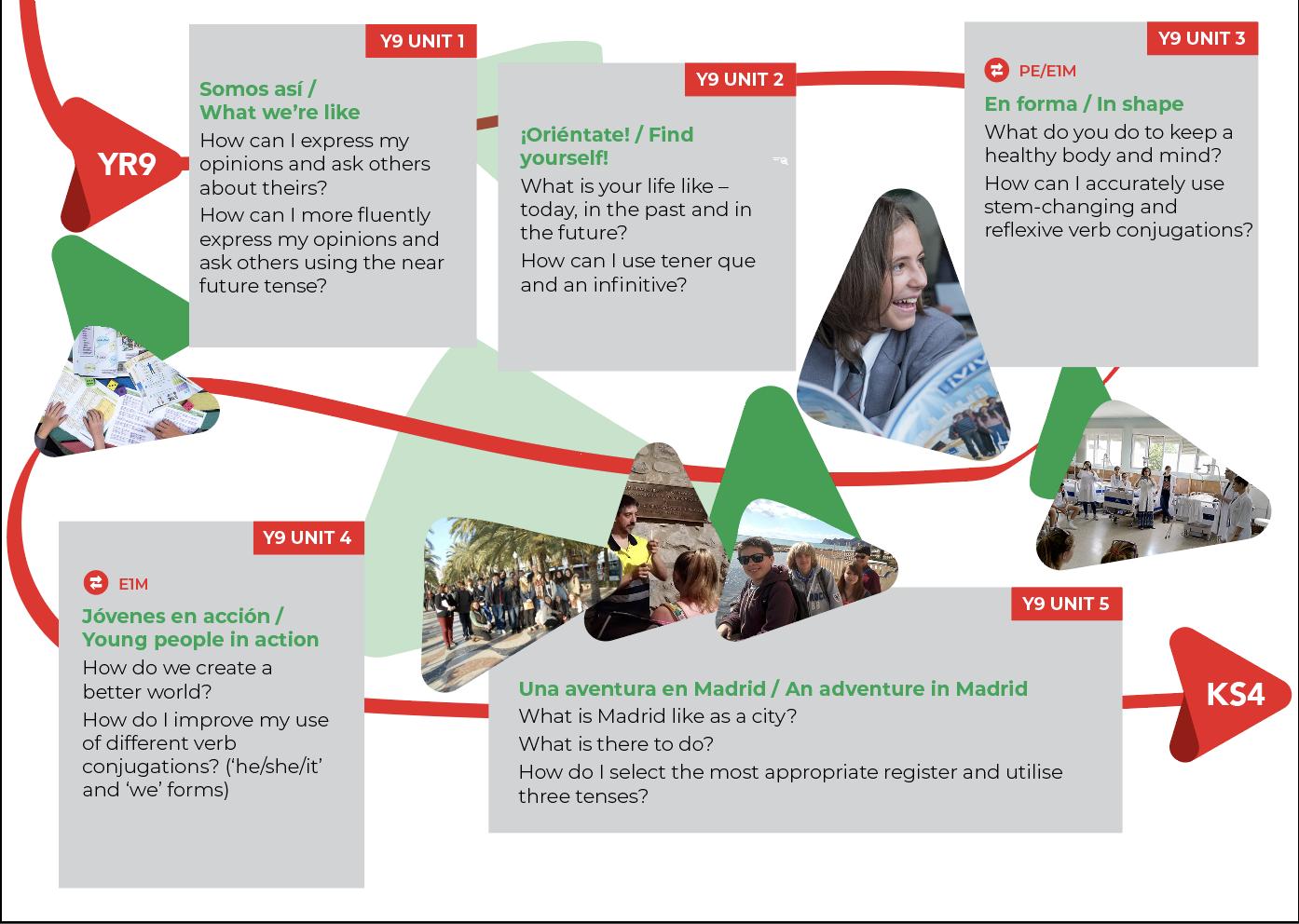
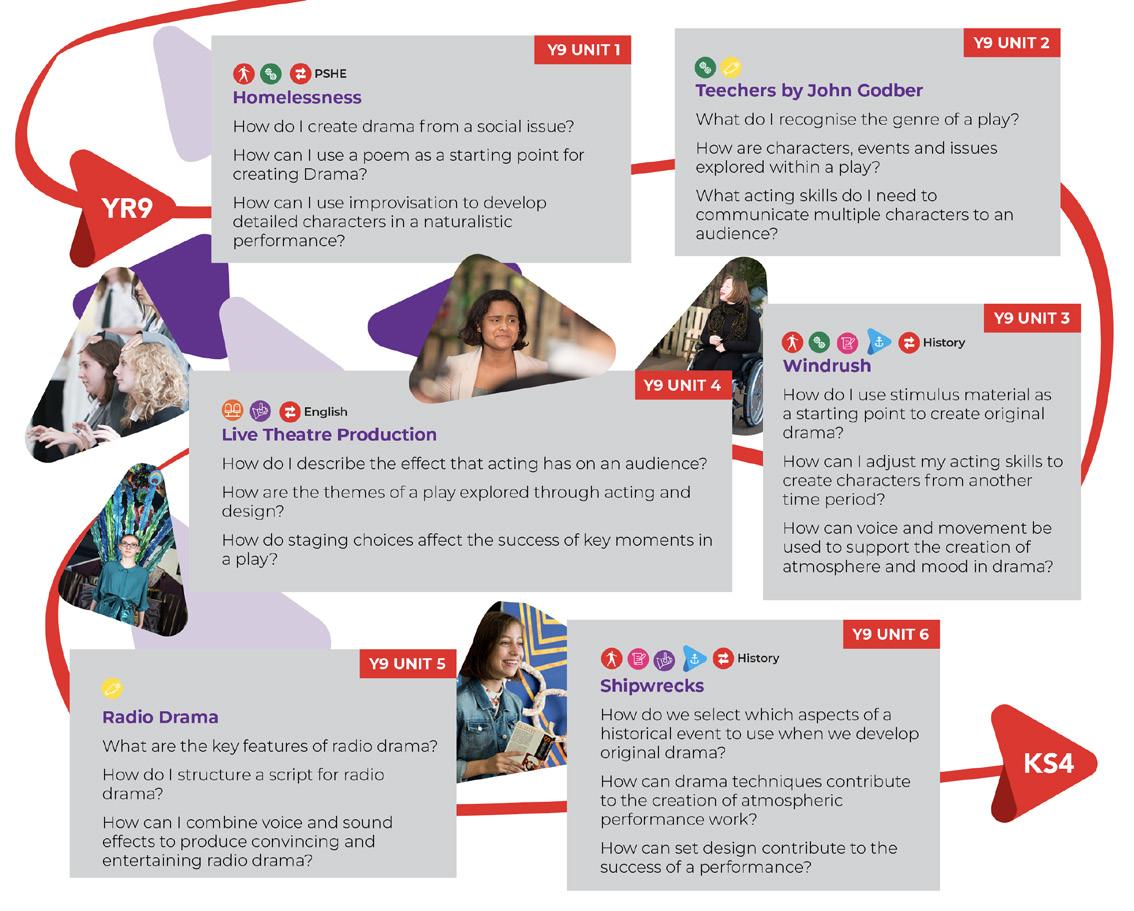
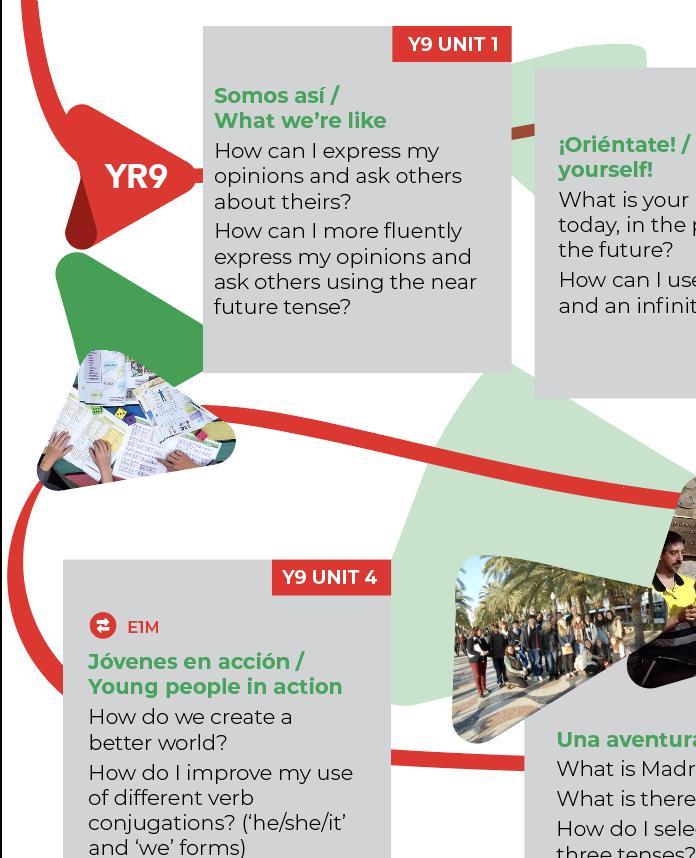
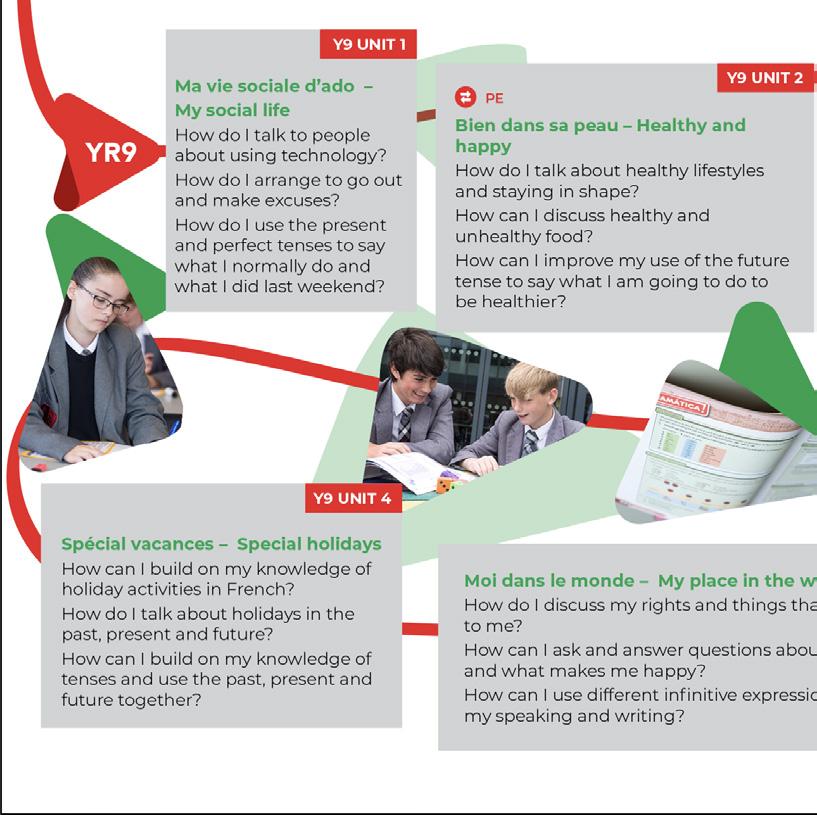
2022 - 2023
MotionWhathappenswhen forcesareunbalanced? Howisspeedcalculated?
Y9UNIT6
InheritanceWhatisDNA?Howaretraitsinherited?
Radiationandelectromagnetic wavesWhatisradiation? Howareelectromagneticwaves used?
betweenanelement andacompound? Howareallknown elementsdisplayed?
Y9UNIT9
Whatareexothermicand endothermicreactions? Howdoreactionprofilesshow energychangeinareaction?
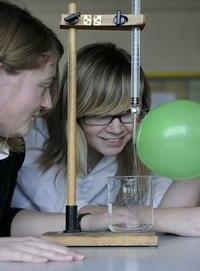
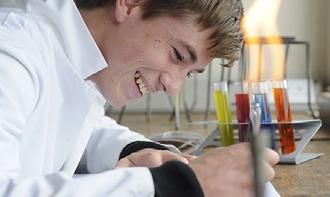

2 | Cowes Enterprise College | Yr 9 Curriculum Information Booklet 2022-23 Contents Introduction 3 Subjects Art 4 Drama 6 Design and Technology (Food, Textiles, Resistant Materials) 8 Design and Technology (ICT and Computer Science) 10 English 12 Everyone Matters (E1M) 14 French 16 Geography 18 History 20 Maths 22 Music 24 PE 26 Religious Studies 28 Science 30 Spanish 32 Maritime 34 Interesting podcasts 36 Reporting schedule 38
Curriculum information | Year 9 KS3
Curriculum information booklet
The curriculum at Cowes Enterprise College extends from years 7 to 13 and includes both the formal timetabled curriculum and all the informal learning and development that occurs outside the timetable.
The purpose of the curriculum in all OAT schools is to
• Teach – the curriculum sets out the knowledge and skills students are entitled to
• Develop – the curriculum sets out how students will develop socially and emotionally
• Change – the curriculum is designed so that any student can excel, so that no one is disadvantaged
The most common question we are asked at parents’ evenings is “how can I support my child?”. This booklet aims to give you useful information that will help you support your child through their year 9 learning journey. If you require any further information, please email info@cowesec.org and your query will be forwarded to the appropriate person.
Assessment and reporting
In order to improve the relevance of the information that we are able to send home in reports, we are changing how we do this at KS3 for this academic year. Instead of sending out a written report once a year, on a set date, that includes all subjects, we are moving to a system where each subject has been able to set their own assessment and reporting schedule to fit in with the rhythm of their curriculum. They will report in a format that lends best to the information they are sharing.
Assessment is something that occurs in classrooms on a daily basis through questioning and observation and enables us to adapt our teaching instantly to meet the needs of our students. Knowledge recall quizzes are set regularly for homework and more formal assessments are used to measure whether long-term learning has been achieved.
Reports are sent home through the SIMS App. If you will need paper copies instead, please let us know through info@cowesec.org.
Subject information
Each subject has included their year 9 curriculum overview, details on how and when learning will be assessed, their reporting schedule and links for useful information, for example, websites, curriculum content/knowledge organisers and wider reading.
Timetabled lessons
There are 25 hour-long lessons on the timetable each week and a 20-minute tutor time every day, during which tutor groups take part in whole-class reading and charter activities. The lessons are distributed as follows:
Cowes Enterprise College | Yr9 Curriculum Information Booklet 2022-23 | 3
English 4 Art 1 Maths 4 Design Technology & Computing 2 Science 4 Music 1 Humanities (History & Geography) 2 Drama 1 Religious Studies 1 E1M 1 Languages (French or Spanish) 2 Games 2
Art | Year 9 KS3
Overview
In Art & Design students are introduced to a wide range of techniques, media and genres. There are four main components that run throughout the KS3 course: RECORDING and DEVELOPING ideas, USING ARTISTS AND DESIGNERS as an influence, REFINING of practical skills and CRITICAL AWARENESS. There are three projects in Year Nine: Basic Skills, Biosphere 3D & Printmaking Project and Identity. These projects are designed to build students’ confidence in a wide range of techniques and form the foundations of the KS3 Art & Design Curriculum, which will then be built upon each year. The practical skills covered will include: drawing, painting and other colour media, 3D- clay, collage & mixed media and printmaking. Students will have their own Art & Design Folder which acts as a ‘sketch book’, in which the majority of their work will be kept. They are expected to have their own HB pencil, rubber, and sharpener and bring these to every lesson.
Yr 9 learning journey
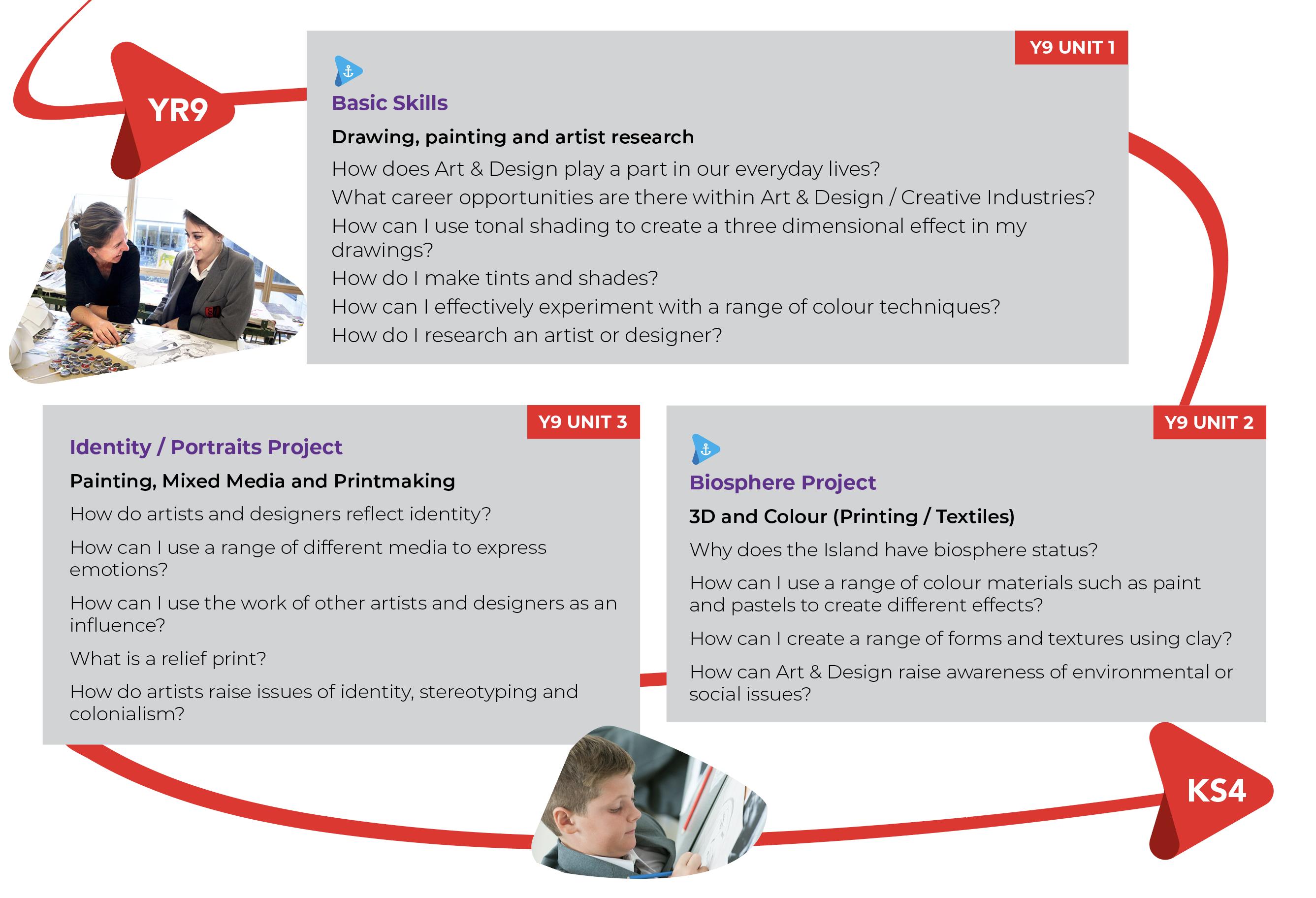
4 | Cowes Enterprise College | Yr 9 Curriculum Information Booklet 2022-23
Art | Year 9 KS3
When and how assessment of learning will happen
The first half term will be a basic skills project where students will carry out several tasks which will be used as a baseline assessment for the start of year 9.
Students will also be assessed formally at the end of each project, in addition to this, students will be given continual informal assessment and feedback throughout each project.
You will receive a report home twice a year, towards the beginning of February and again in July.
The first will reflect on the work and skills completed so far in the Basic Skills project and the Biosphere 3D & Printmaking Project, and the second will give a more complete ‘overview’ of your child’s progress and attainment for the whole year. There will also be comments on how to improve further and useful information to extend your child’s knowledge and understanding of Art & Design.
Useful information
It is always a great idea to expand your child’s experiences as much as possible and one way is to visit a gallery. Being able to talk about and reflect upon artwork is a key part of our curriculum and so having opportunities to do this will help your child gain in confidence not just in Art & Design but other subjects too.
Here are some of the Key Artists and Designers that we will be featuring in Yr9 that you may wish to find out about in advance: Courtney Mattison, Alejandro Duran, Helen Wells.
Local galleries:
Quay Arts - Newport, Creative Hub - Newport, City Art Gallery - Southampton, The John Hansard GallerySouthampton. Portsmouth Museum and Art Gallery, Aspex Gallery - Portsmouth.
Or why not take an online “virtual tour” at the national gallery Virtual tours | Visiting | National Gallery, London
Homework expectations
Homework is set each half term and students have a choice of tasks that are related to their current theme. They are expected to complete four tasks that should take between 30 - 45mins each. We are happy to supply any materials and equipment that students need for homework. We find students really enjoy the Art & Design tasks as it offers opportunities to show their independence and creativity.
Cowes Enterprise College | Yr9 Curriculum Information Booklet 2022-23 | 5
Drama | Year 9 KS3
Overview
Across KS3 we focus on building the 4 C’s confidence, communication, co-operation and creativity as these will enable students to take an active part in Drama but are also excellent life skills.
The year 9 Drama schemes build on the Drama skills that students learnt in year 8 and further develop their Drama knowledge, skills and techniques. As part of their learning the students work in different group sizes using both improvisation and scripts to create performances. They continue to develop their ability to reflect and evaluate their own Drama work in order to make progress as well as that of professional actors. The four units of work for year 9 and shown below.
Yr 9 learning journey
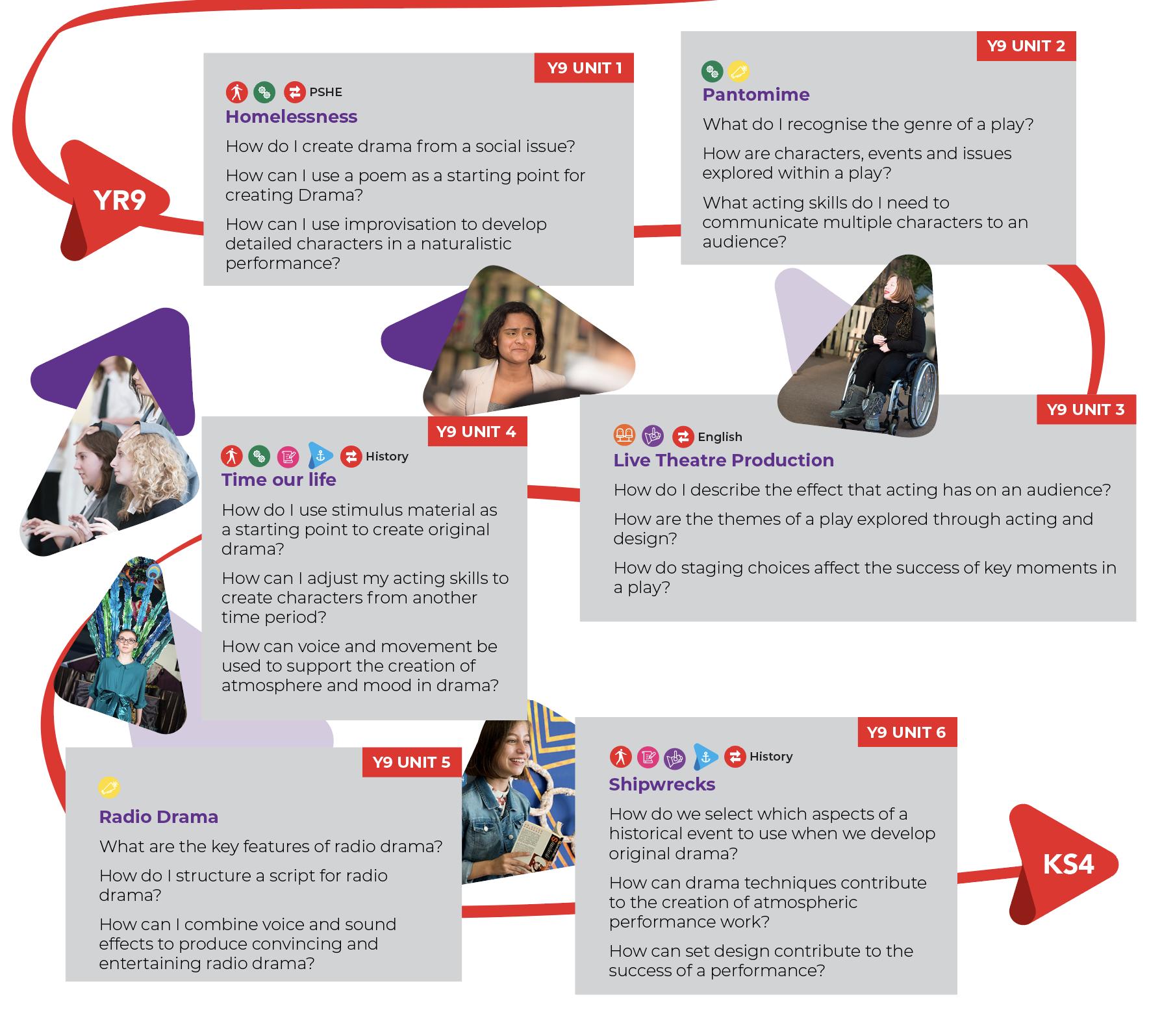
6 | Cowes Enterprise College | Yr 9 Curriculum Information Booklet 2022-23
Drama | Year 9 KS3
When and how assessment of learning will happen
To assess learning in Drama, our year 9 students will complete an in-class assessment at the end of each topic. These will take place during or at the end of each unit of work. Within each in-class assessment, students will be assessed in five strands; Group work and planning skills, Creativity, Artistic intention, Voice and Movement skills, and Reflecting and Evaluating.
Reports will go home at the beginning of November and towards the end of May. These will give information on three half-terms’ work and will give the current attainment and information across the five strands on how to improve further.
Useful information
TThe best way to understand Drama and theatre is to see it. There are now a wide range of online resources as well as local theatres that you can go to.
To really improve a student’s Drama skills, getting involved in our school plays is a great free way to do this. We are totally inclusive and everyone is welcome whether they want to be on stage or work backstage, all we ask is that they are present at rehearsals and performances and try their best.
Drama online is free and the school has an account that your child will be given access to via Show my homework:
https://www.dramaonlinelibrary.com/
Drama and theatre are created from a wide range of stimulus material. Social issues can be used to create effective drama pieces and allow the performers and audience to explore other people’s lives. This style of theatre is often described as community theatre, and or theatre in education. Both can be created, and performed by professionals or amateurs. This includes work in prisons, schools, retirement homes, and with much wider sections of society than mainstream theatres include.
https://www.arcolatheatre.com/participation/communitycompanies/ http://www.geese.co.uk/work/adults/prisons/ https://www.halfmoon.org.uk/
https://www.theguardian.com/stage/2018/mar/13/british-theatre-class-problem
http://www.redladder.co.uk/about/history/ https://highlysprungperformance.co.uk/
Key professional theatres include:
https://www.nationaltheatre.org.uk/ and https://www.rsc.org.uk/
Local theatres include:
https://www.mayflower.org.uk/ https://www.kingsportsmouth.co.uk/
https://www.mayflowerstudios.org.uk/
https://www.cft.org.uk/ https://www.quayarts.org/
BBC Bitesize is a great place to start for understanding more about Drama skills. https://www.bbc.co.uk/bitesize/examspecs/zrnjwty
Homework expectations
Drama homework will be set to ensure that it is effective and supports the work taking place in class. It will be set every half term with students choosing from a range of tasks for that unit.
Cowes Enterprise College | Yr9 Curriculum Information Booklet 2022-23 | 7
Design & Technology | Year 9 KS3
Food, Textiles, Resistant Materials
Overview
In Design Technology across KS3 we use a structure of a carousel of different specialisms to ensure students get a broad and balanced approach of the Design & Technology and Food curriculum areas. Each student completes a half term on rotation across the carousel within each specialism. We have 4 half terms for these specialisms and we share the timetable with Computing (Computing has 2 half terms).
Students access workshops, tools and materials to design and make working products to develop student knowledge and experience in specialist classrooms, kitchens and workshops. From day one we ensure students access and engage fully in safe use of our specialist areas. Our subject provides an active, out of your seat learning environment, utilising team challenges, paired work and individual activities to provide many opportunities to explore the subject across the Key Stage and develop a breadth of experience in each specialism. Across KS3 the activities and projects are scaled, to ensure students build year-on-year their experience in the specialisms.
We are a fundamental and integral element of the maritime thematic curriculum here at CEC. Our students learn about the maritime environment of our local area, setting in context the world of work, careers and the skills of the maritime world. All projects integrate maritime links within the specialisms’ curriculum.
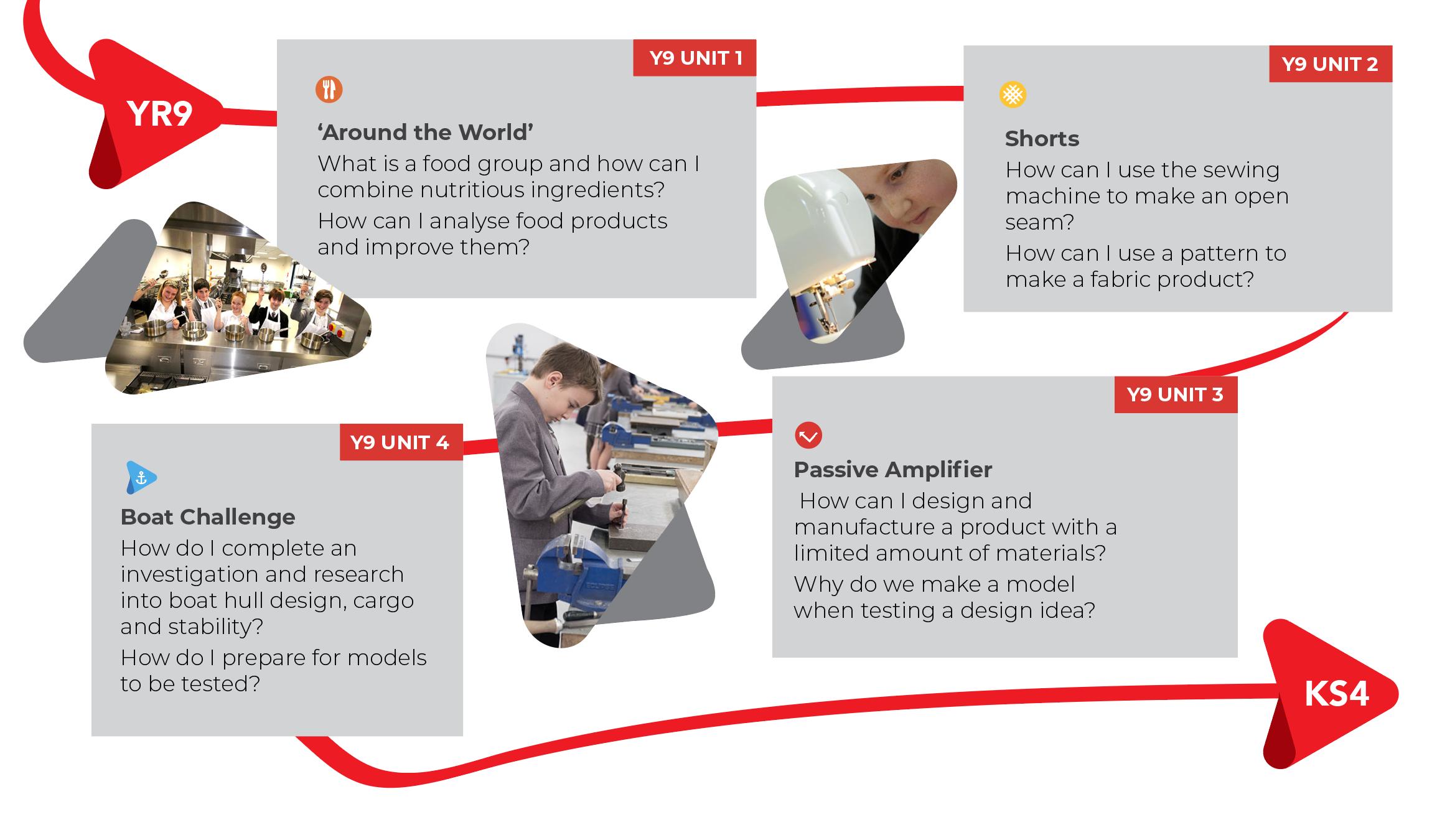
Yr 9 learning journey
Unlike other Learning Journeys, in DT students may cover the units in a different order but will complete all units during the course of the year.
8 | Cowes Enterprise College | Yr 9 Curriculum Information Booklet 2022-23
Design & Technology | Year 9 KS3
Food, Textiles, Resistant Materials
Students will complete each of the following during a half term, across our timetabled four half terms:
• Textiles – Students will respond to a design context and creatively design and manufacture high quality machine sewn leisure wear. Developing pattern cutting and practical skills alongside design and creativity.
• Food – Students investigate combining ingredients to produce tasty and well balanced and nutritious meals from different countries. They will also develop their practical skills in our wonderful kitchen, making products to taste, evaluate and develop. This introduction to the kitchen explores and uses a host of equipment. We call this ‘Around the World’ where the cultural products students produce are from around the world.
• Resistant Materials – We focus developing our students’ experiences of the workshop. Students respond to a design context and design and manufacture a high-quality beech ply passive speaker for a mobile device. We also develop communication and design skills that help communicate ideas within the design cycle as well as look into sustainability of materials.
• Maritime – This is a groundbreaking team-based STEM challenge where student teams respond to a series of criteria. The project builds on the skills of Resistant Materials and students’ use of the workshop and tools and materials. Students complete the Team challenge looking at properties, selection and use of materials. Students take on roles in their team to research materials, their effectiveness for a particular maritime related role and then create a final product to test in our testing tank. We integrally develop employability skills of cooperation, sharing, teamwork and leadership as well as specific career roles and jobs. Meeting deadlines is critical. We integrate research into maritime careers.
When and how assessment of learning will happen
Assessment takes a variety of forms in our specialisms from verbal feedback in the workshop and kitchen during practicals, through multiple choice quizzes and related class and homework activities. Individual and peer reflection are integral as well as reading, sharing and expressing our thoughts and designs. Employability skills are also reviewed. Each student will receive a detailed report each term, from the specialisms they have completed. This will include the attainment and progress they have made during the projects, provide some useful tips and links to activities that could be completed to develop and support progress.
As students complete different specialisms as part of the carousel, students will receive reports from these areas at different times to some of their peers.
Useful information
Design Museum, London - https://designmuseum.org/
Technology student website - https://www.technologystudent.com/
OAT’s maritime careers - https://oatfutures.co.uk/sectors/maritime/
BBC Bitesize – Design Technology - https://www.bbc.co.uk/bitesize/subjects/zvg4d2p
Design Council - https://www.designcouncil.org.uk/
British Nutrition Foundation - https://www.nutrition.org.uk/
Design Technology – careers website - https://www.bbc.co.uk/bitesize/tags/zn7h8xs/jobs-that-use-design-andtechnology/1
Homework expectations
Students are expected to access Show My Homework, the CEC online hub for issuing homework. We use a variety of formats for homeworks. Homework tasks are set to build on the learning in class or check and reinforce and revisit topics, to support making further progress and checking and testing knowledge acquisition, retention and application.
It is usual that a homework task or activity sheet is carefully returned to school and submitted in class or if electronic to be completed online. It is expected that homework is completed to a high standard.
All homework tasks can be printed if students have trouble accessing the online task. Deadlines for homeworks are expected to be met, and to support inclusivity we understand that this may not be possible on occasion and a note to the teacher can then support completion.
Design & Technology | Year 9 KS3
ICT and Computer Science
Overview
This year will see new and interesting topics being introduced into the IT and Computer Science rotation. The lessons form part of the Design Technology rotation, and your child will be timetabled to a term in which they will have these lessons.
Students will continue their three-year journey learning a range of knowledge and practical skills allowing them to expand their confidence, application and creativity as well as giving them skills that they will be able to use throughout their lives. The diverse range of skills will also support them in their other subjects to be able to access, present and consolidate their IT skills. They will also gain a firm foundation for KS4 and KS5 options later in their school career.
Yr 9 Learning Journey
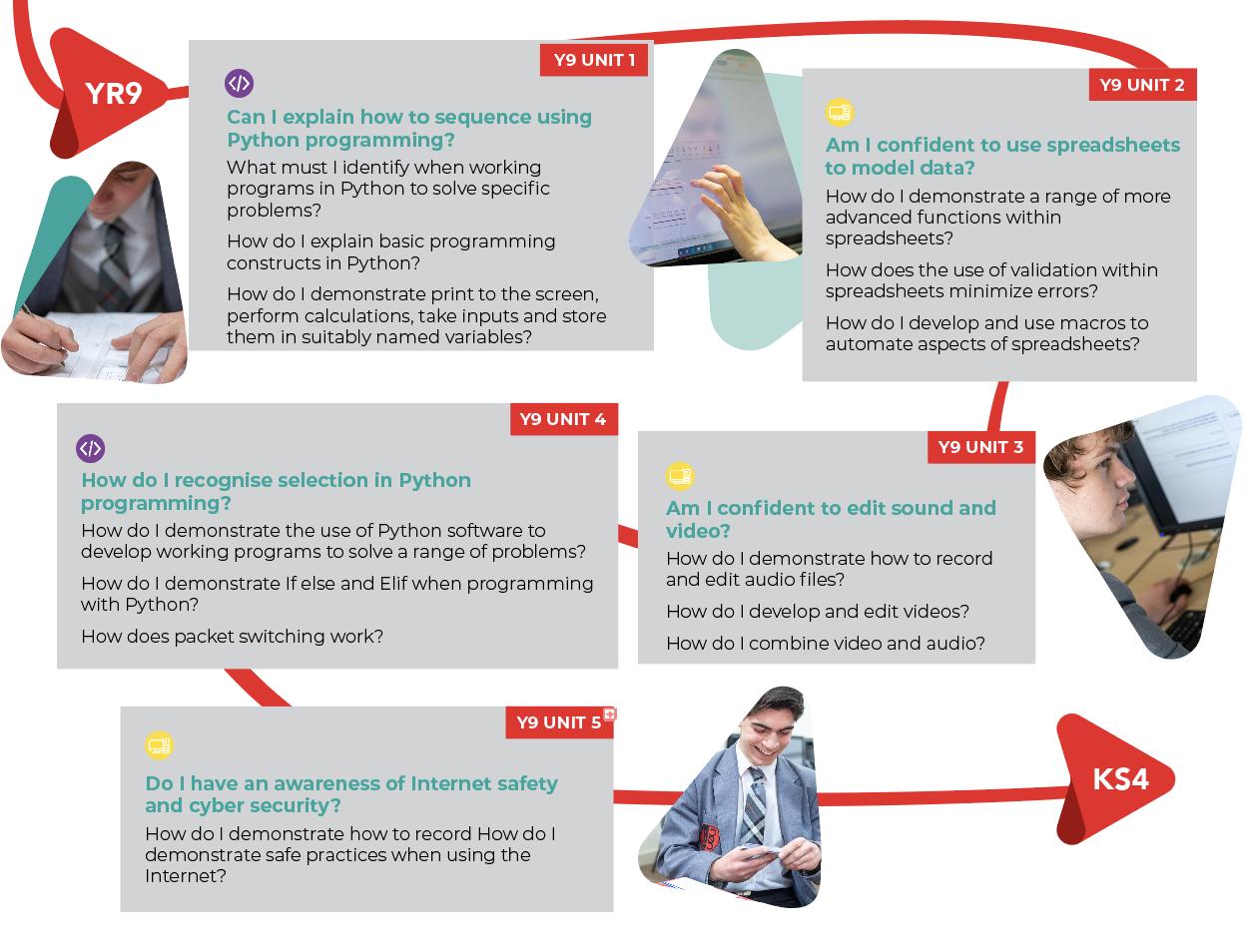
10 | Cowes Enterprise College | Yr 9 Curriculum Information Booklet 2022-23
Design & Technology | Year 9 KS3
ICT and Computer Science
When and how assessment of learning will happen
When and how assessment of learning will happen
Assessment consists of a mix of in-class work and digital exam style assessment. The students are continuously assessed on their recall and at the end of each topic their written work will be assessed against the criteria given to them at the beginning of the topic. They are assessed against their theory knowledge and practical application.
Reporting
You will receive a report home at the end of the rotation in which your child has been allocated:
Rotation 1 – End of Term 1
Rotation 2 – End of Term 2
Rotation 3 – End of Term 3
Curriculum topics
Programming in Python: Sequence Computer programmes, User data, Data types, Placeholders & lists, Working with lists, Working with strings
Advanced Spreadsheet Drop-down list, VLOOKUP & sorting data, Check boxes, Macros, Logical operators and the REPT function
Sound and Video Editing Introduction to sound editing and Audacity, Audio effects, Planning a video advert, Creating a soundtrack for a video advert, Introduction to video editing and OpenShot, Visual effects
Programming in Python: Selection Decisions based on calculations, If else, Comparing strings and numbers, Elif, Multiple elifs
Internet Safety Cyber Security & Encryption Digital footprint, Passwords & phishing, malware
Useful information
https://scratch.mit.edu/
https://www.codecademy.com/
https://boost-learning.com/
We try to use freeware when appropriate to encourage students to access software from home: MU: https://codewith.mu/en/download
GIMP: https://www.gimp.org/downloads/
PYTHON 3.10.5: https://www.python.org/downloads/release/python-3105/
AUDACITY: https://www.audacityteam.org/download/
OPENSHOT: https://www.openshot.org/download/
Homework expectations
A short homework task is set every lesson, this is usually a short digital quiz to assess their recall from the previous lesson or a research task in preparation for the next lesson.
Cowes Enterprise College | Yr9 Curriculum Information Booklet 2022-23 | 11
English | Year 9 KS3
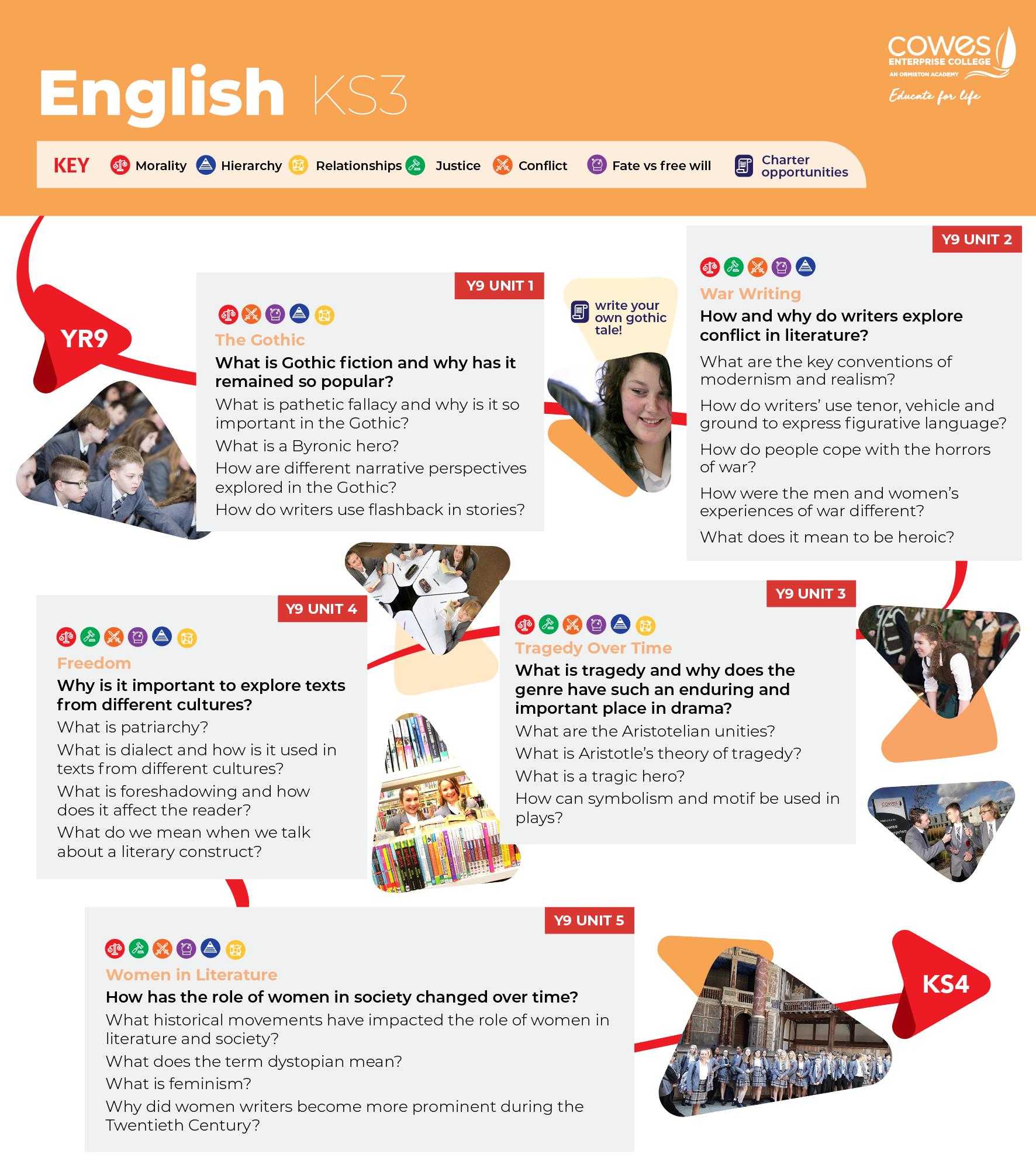
Overview
We are very proud to introduce our new English curriculum, fresh for Sept 2022. Our new Year 9 program of study continues to broaden our students’ knowledge and understanding of what we feel are the most influential and beautiful stories ever written. In English literature, we call these works ‘the literary canon.’ By the end of year 9, students will have read and studied:
The Gothic Tradition: Wuthering Heights by Emily Bronte
War Writing: Journey’s End by R C Sheriff
Tragedy through Time: Othello by William Shakespeare
Freedom: The Eyes Were Watching God by Zora Neale Hurston
Women In Literature: The Yellow Wallpaper by Charlotte Perkins Gilman
Each of these foundational texts are accompanied by a range of complementary texts equally as inspiring and important in the literary canon. Using these texts, students will also complete a variety of creative writing and speaking and listening tasks.
Yr 9 learning journey
When and how assessment of learning will happen
We will be posting the assessment in advance of the unit on show my homework and showing the children exactly what they will need to know for their end of unit test. The test might be sat all in one session, or the teacher might choose to break the assessments into smaller parts and your child will attempt these at different points during the unit. Our assessments consist of short answer questions, multiple choice, writing short paragraphs and a few longer style questions: we aim for your child to achieve 100% on these assessments.
You should be receiving a comprehensive report home: approximately the week of December 5th approximately the week of Week of May 18th
• approximately the week of July 10th
You will have already seen the assessment on Show My Homework, but the report will show you exactly what your child achieves on the assessment.
Useful information
What can be better than curling up with a great book? We expect children to read at home in evenings for at least ten minutes every evening.
Our fantastic library is well stocked and waiting for students to borrow books! Children are welcome to come and read any time after 8 am and up to 4 pm, including break times and lunch times. Books can be borrowed for three weeks and if, by some mysterious twist of fate, we do not have the book a student is after, they should be sure to fill in a ‘book request’ form, found next to Mrs Wooton’s desk and we will be sure to get it for them. English teachers will also take their classes to the library and show students where everything is.
Be sure to check out our monthly library newsletter we will send home at the end of each month for reviews of the latest books, staff and student recommendations and tips for finding the perfect book.
Homework expectations
As well as the minimum ten minutes reading, homework tasks include quizzes, research, creative writing, spelling, watching and commenting on video clips and lots of exciting activities that will stretch and broaden students’ experience of the curriculum.
Useful links
BBC 4 Radio: In our time – Wuthering Heights
University of Oxford: A Writer’s War (ww1 writing podcast)
Apple podcast: What it means to be a Moor (Othello)
Apple podcast: Romantic Black Feminist Heroines
BBC radio 4: Othello: Love across a racial divide
Blackchitlit: Their Eyes were watching God
Cowes Enterprise College | Yr9 Curriculum Information Booklet 2022-23 | 13
English | Year 9 KS3
Everyone Matters | Year 9 KS3
Overview
Our innovative Everyone Matters (E1M) subject is a personal development programme. We help students learn more about the world and how to keep themselves safe, healthy and positive. Students will learn ways to make a positive difference to the world through this curriculum, as well as taking part in a Social Action project in our local community. By the end of Year 9, the students will have explored five key questions.
How do I keep myself and others safe?
• How do I keep myself healthy?
How can I be the change I want to see?
• What is respect?
• How can I prepare for life in the modern world?
Yr 9 learning journey
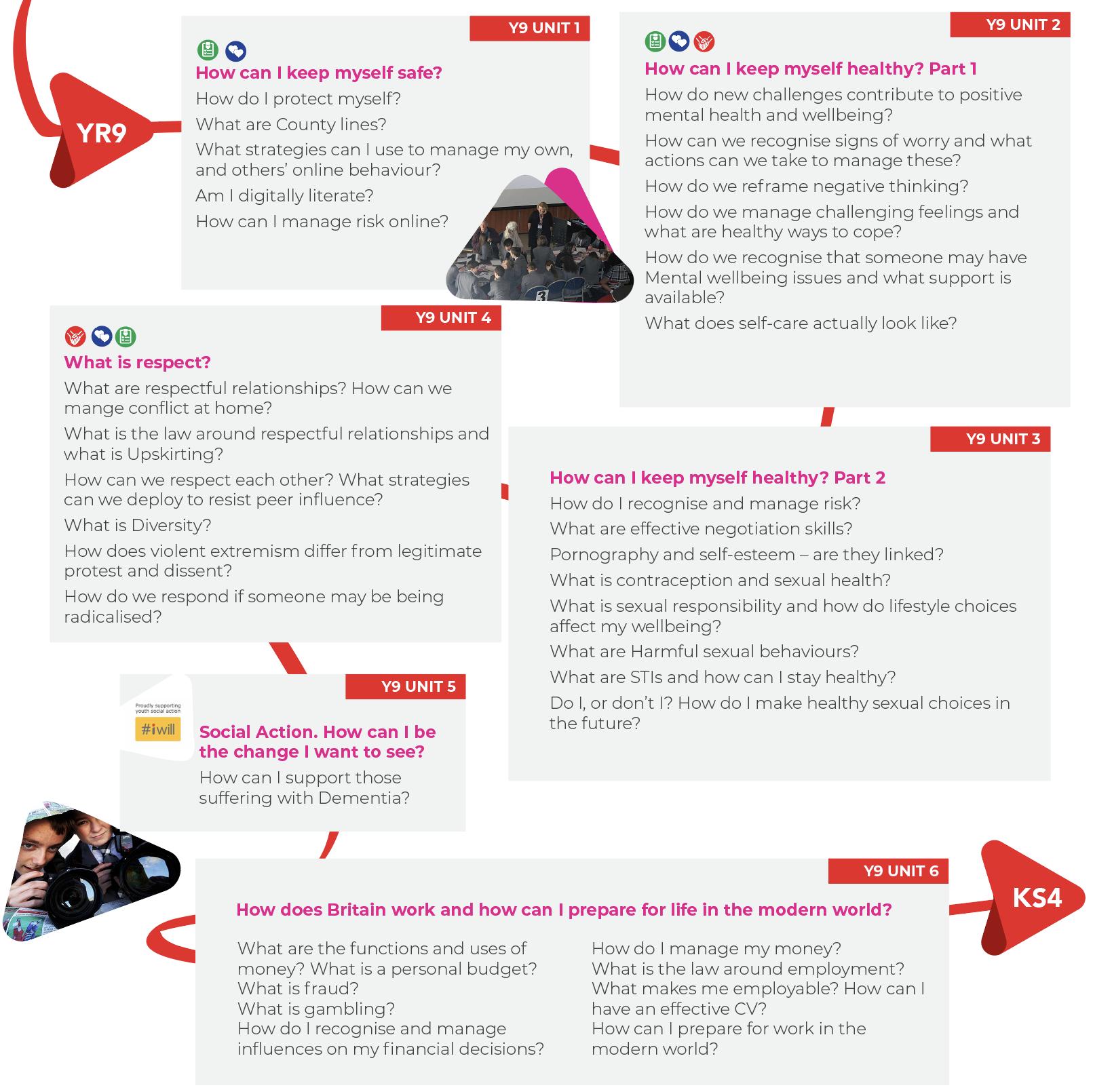
14 | Cowes Enterprise College | Yr 9 Curriculum Information Booklet 2022-23
Everyone Matters | Year 9 KS3
When and how assessment of learning will happen
In E1M, students will be regularly assessed through self-assessments. This will take place at the beginning and end of each topic to assess learning and to identify any knowledge gaps. The self-assessments consist of short questions to assess knowledge and understanding. Further assessment opportunities will also take place during lessons where students will be given the opportunity to partake in Q&A discussion activities, and regular reflection opportunities.
Useful information
There are a wide range of online resources available to support in E1M curriculum discussion at home.
Unit 1: How can I keep myself safe?
The following websites will provide further information on safety topics including county lines, self-protection and managing risk and online behaviour.
www.childline.org.uk
www.think.gov.uk
www.internetmatters.org
www.crimestoppers-uk.org
www.nspcc.org.uk
www.respectthewater.com
www.ceop.police.uk
www.saferinternet.org.uk
Unit 2 and 3: How can I keep myself healthy? Part 1/Part 2
www.childnet.com
www.thinkuknow.co.uk
www.abettermedway.co.uk
The following websites will provide further information on safety topics including positive wellbeing, sexual responsibility, STIs, pornography and self-esteem and the impact of lifestyle choices.
www.childline.org.uk
www.nhs.uk/change4life
www.talktofrank.com
www.kidshealth.org
www.nspcc.org.uk
www.quit.org.uk
www.youngminds.org.uk
www.riseabove.org.uk
www.thinkuknow.co.uk
www.ash.org.uk
www.brook.org.uk
Human sexuality and relationships - GCSE Religious Studies Revision - BBC Bitesize
Teen Body Image and Self Esteem: A Practical Guide for Parents (freederm.co.uk)
Unit 4: What is respect?
The following websites will provide further information on peer pressure, diversity, the law around up skirting, extremism and radicalisation, and legal rights and responsibilities around relationships
www.childline.org.uk
www.themix.org.uk
www.youthwellbeing.co.uk
www.nspcc.org.uk
www.youngminds.org.uk
www.mind.org.uk
www.youthaccess.org.uk
Safeguarding-child-protection/radicalisation
Unit 5 – How can I be the change I want to see?
The students will make a positive impact on our local community by taking part in a Social Action project. This year the students will learn about how we can support those suffering with Dementia.
Unit 6: How does Britain work? How can I prepare for life in the modern world?
The following websites will provide further information on finances, gambling and employable skills.
National Careers Service: https://nationalcareers.service.gov.uk
• The Money Advice Service – how to teach children about money: www.moneyadviceservice.org.uk/en/articles/how-to-talk-to-your-children-about-money
Tips for parents: children and online gaming - Gambling Commission
Cowes Enterprise College | Yr9 Curriculum Information Booklet 2022-23 | 15
French | Year 9 KS3
Overview
Year 9 is a key transitional year in MFL in which students are taught to consolidate and apply their invaluable knowledge from Year 7 and 8 to a greater depth on familiar and new topics. These new topics will challenge their thinking about the world around them, such as their use of technology and the media, the world of work, healthy lifestyles and a broader awareness of the cultural celebrations of the target language country. The focus is also for students to gain a mastery of the core vocabulary and grammatical skills that will underpin their learning at GCSE. Students are expected to apply their fundamental building blocks of knowledge to greater depth and detail. There is a focus in Year 9 on students honing their written communication skills with an expectation that their knowledge is robust enough to now develop their oracy, unconsciously applying their knowledge as skills.
Yr 9 learning journey
When and how assessment of learning will happen
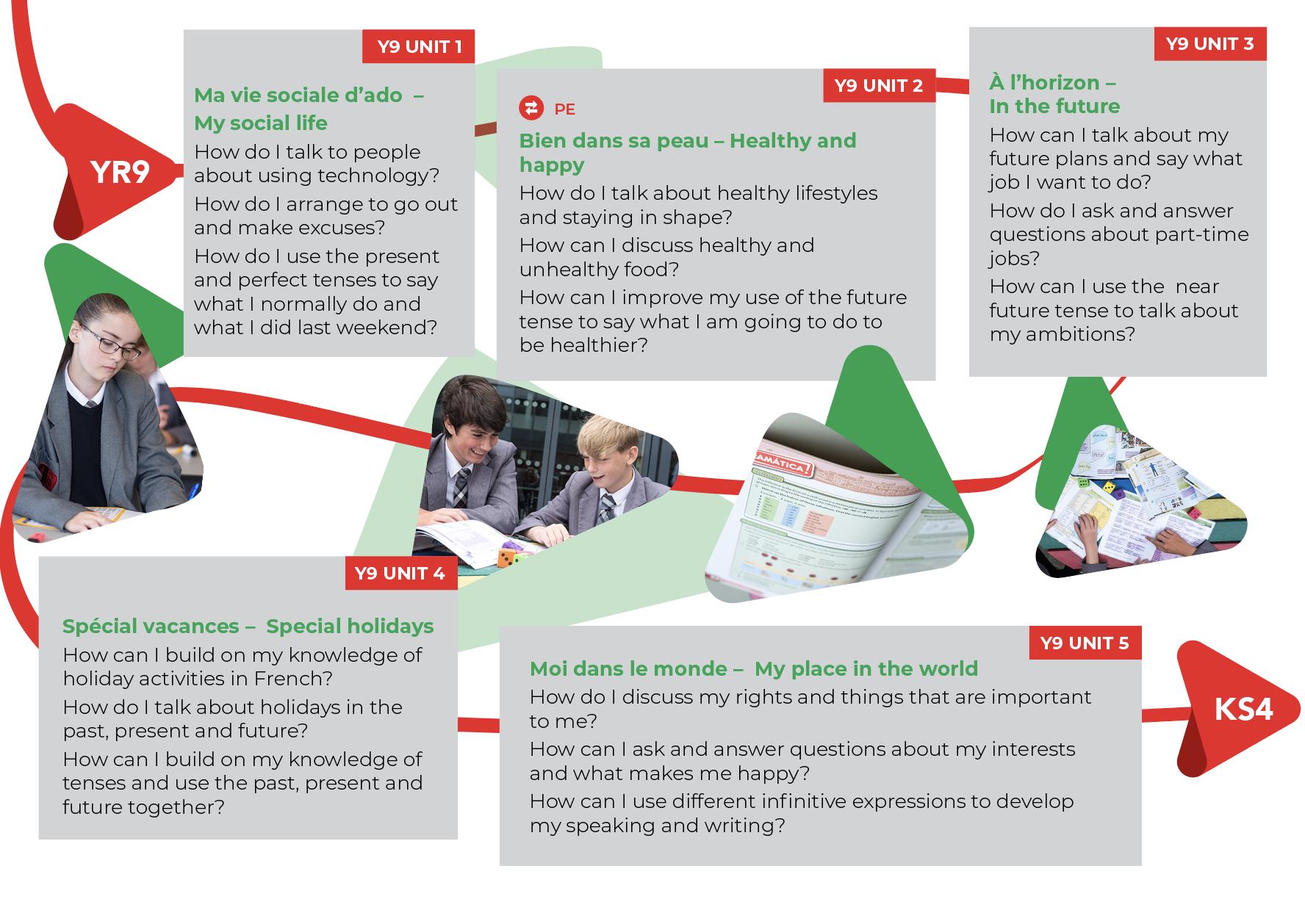
16 | Cowes Enterprise College | Yr 9 Curriculum Information Booklet 2022-23
Topic Assessment Focus When My Social Life – discussing technology and going out Listening / Speaking End of half term 1 Healthy and Happy – discussing healthy lifestyles Reading / Writing End of half term 2 In the Future – jobs and future plans Listening / Speaking End of half term 3 Special Holidays Reading / Writing End of half term 4 My place in the world – talking about children’s rights Listening / Speaking End of half term 6
How skills are assessed
Listening
Speaking
Students will show that they can understand the main points of short, spoken texts as well as longer texts on each topic, including reference to future and past events.
Students will demonstrate that they can accurately pronounce the majority of vocabulary from the Y9 curriculum. Students will have short conversations about the topics studied. They will use the present, past and future tenses.
Reading Students will demonstrate their understanding of main points, opinions and details in short and longer written texts, including reference to future and past events.
Writing
Students will aim to write texts using language from memory, giving opinions with reasons, using time expressions, sequencers, frequency expressions and referring to present, past and future events.
Useful information
Vocabulary learning is vital for language acquisition. Please try some of these…
Use “Look-cover-write-check” or “Look-cover-say-check” strategy for revision for speaking and writing tests
Play games with your child to learn the vocabulary – use the links for the online resource “blooket” given each week on SMHW
• Sticky notes: Ask your child to write new vocabulary on sticky notes and stick them where he/she will see them often. For example, he/she could stick them to the bathroom mirror to read through every time he/she washes their hands or brushes his/her teeth
Make cards: Cut up some paper or card into small rectangles. Write one target language word on each card. Write out the English words too, one word per card. Mix them up and match the cards! You can play snap with them or turn them all upside down and try to find the pairs.
Use languages online link below to help your child learn the present tense
https://www.languagesonline.org.uk/French/Grammar/Begin_Perfect_Tense/index.htm
https://www.languagesonline.org.uk/French/Grammar/Present_Tense/index.htm
https://www.languagesonline.org.uk/French/Grammar/Aller_Infinitive/index.htm
Homework expectations
Each Friday, a link to “quizlet” and the online learning resource “blooket” will be provided on Show My Homework (SMHW) for your child to start learning the key vocabulary for the unit to be taught the following week. Encourage your child to review the vocabulary on their preferred site (you will need to help them make an account using their school email). Ideally, your child should spend 10 minutes per day reviewing the vocabulary and at the end of the week, they should complete either the spelling test or vocabulary quiz (or both!) on Show My Homework (SMHW) to show their teacher they have retained the vocabulary. This is due every Friday. If you require a paper copy of the key vocabulary, please email your child’s class teacher or info@cowesec.org. Thorough preparation is also expected for speaking and writing tests.
Cowes Enterprise College | Yr9 Curriculum Information Booklet 2022-23 | 17
French | Year 9 KS3
Overview
In year 9 we are wanting our geographers to build on their learning from year 7 and 8 and we aim to explore contemporary issues so to understand the interaction between people and the environment, the effects of this and the need for management, especially sustainability, resource management and climate change. Through our country study of Russia, we can learn about human and physical interactions and connections to geopolitics. Alongside the factual (substantive) knowledge, students will also be taught the key disciplinary concepts in geography.
Location for students to be able to locate places, features and people at a range of scales, from local to global. For example, we want year 9 geographers to be secure in their location of countries and places of importance globally.
Place Here we want our geographers to understand what activities and processes take place in various locations on our Island, in the UK or globally. We will explore the social networks that in turn create values, attitudes and behaviours. For example, in both the resources and climate change topic we will consider the complexities surrounding these topics for a range of places globally.
Human processes
Physical processes
This is our study of the interrelationships between people, place, and environment, and how these vary spatially and over time, across and between locations. In year 9 the theme of sustainability is integral to contemporary topics but also in our Russia topic we can look at changing relationships between countries.
This is our study of Earth’s climate, atmosphere, soil, streams, landforms, and oceans. We also examine how human culture interacts with the natural environment and the way that locations and places can have an impact on people. The resource and climate change topics will consider the importance of physical resources and the need to mitigate against the future risks of running out of resources and climatic changes.
Geographical skills these provide the necessary tools and techniques for us to think geographically. These include GIS (Digital mapping), photo and satellite image interpretations, interpreting data and fieldwork.
These concepts exist through our geography curriculum from year 7 to 13. Each topic is built around a big question with each lesson exploring a particular enquiry question.
Yr 9 learning journey
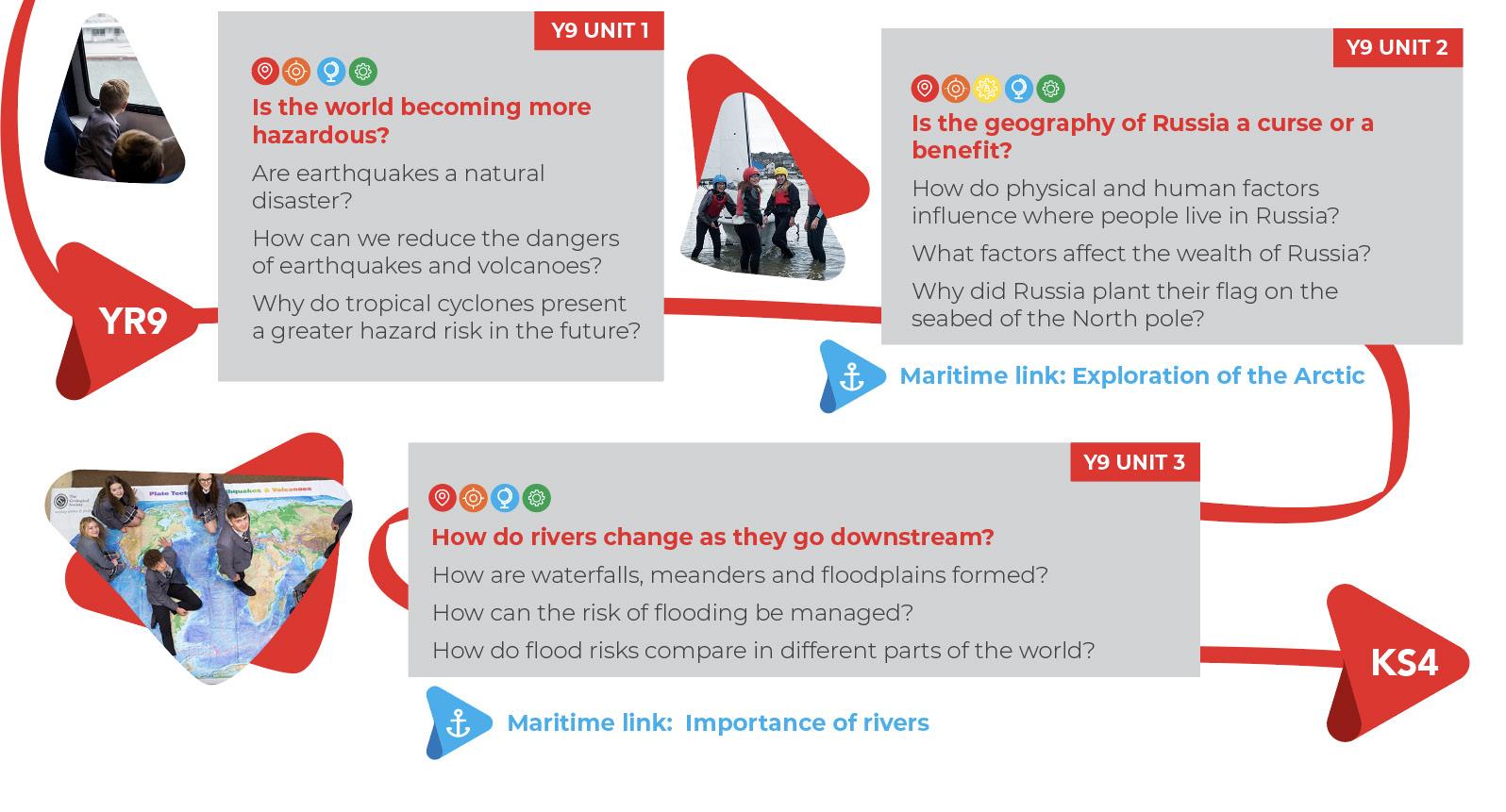
Geography | Year 9 KS3
When and how assessment of learning will happen
To assess learning in Geography, our year 9 students will complete an in-class assessment. These will take place towards the end of the second, fourth and sixth half-terms with reports being sent home in weeks 16, 28 and 40. Within each in-class assessment, students will be assessed in four strands:
• Knowledge – This will assess knowledge of key terms, locations and facts. These will be multiple choice, definition or brief one sentence responses.
• Understanding – This will assess explanation of processes, for example to explain the formation of a V shaped valley. These will be short answer questions requiring a few sentences to complete an explanation.
• Application – This will assess the ability to evaluate or assess based on a place studied in the topic, and will be a structure extended answer.
• Geographical skills – This will assess map skills, data interpretation skills and image analysis. These will be multiple choice, definition or brief one sentence responses.
In addition, they will complete regular knowledge quizzes to help them develop and recall the key ‘must know knowledge’. These will be set in a combination of in-class and online quizzes.
In our Geography subject report you will find:
Useful information about the in-class assessment the students have completed
• A numerical and percentage score from their in-class assessment
• Information and feedback about why a particular score was awarded and an indication of how this could be improved
‘Next steps’ and sources of support to help students improve their performance in the future
• A percentage score from the in-class or online recall quizzes, including feedback about whether they were completed or not.
Useful information
Each Geography report will contain more specific sources of support relevant to each in-class assessment and Geography topic, such as links to relevant online revision tools and access to the knowledge organisers.
In addition to a paper copy in their exercise books, students will always be able to access the relevant knowledge organisers for each Geography topic online on Show My Homework to aid them working on the topic out of lesson, and to further the possibility of specific support being given at home.
Knowledge organisers are concise and precise overviews of the must know knowledge needed for each topic. They also contain the key subject specific vocabulary relevant for each topic.
Homework expectations
Students will be set a knowledge retrieval quiz on Show My Homework (SMHW) each week, linked to the knowledge covered in those lessons. In addition, each topic has a fiction or non-fiction text linked to it and so additional knowledge quizzes will be linked to a section of text from the particular topic. Year 9 Geographers this year will look at extracts from ‘Climate Change: A Very Short Introduction’, ‘A Life on Our Planet: My Witness Statement and a Vision for the Future’ and ‘Prisoners of Geography’.
Cowes Enterprise College | Yr9 Curriculum Information Booklet 2022-23 | 19
Geography | Year 9 KS3
History | Year 9 KS3
Overview
Our curriculum in year 9 continues to build on previous learning and aims to enable our students to gain a coherent knowledge and understanding of Britain’s past and that of the wider world and to inspire students’ curiosity to know more about the past. Across the Key Stage students will cover a broad history of Britain as a coherent, chronological narrative, from the earliest times to the present day, as well as how Britain has influenced and been influenced by the wider world. During our year 9 History lessons, students will have the opportunity to explore rich and diverse stories from the past. They will be taught key ‘must know’ knowledge essential to their deep understanding of the issues we explore. Alongside this factual knowledge, students will also be taught the key disciplinary concepts which make up History as a subject.
Yr 9 learning journey
Across KS3, students will develop their understanding of:
• Continuity and change. Why do some aspects of the past change, sometimes dramatically, whilst other aspects appear to change very little?
Cause and consequence. What causes lead to events happening in the past? What consequences do these lead to and with what impacts?
Similarity and difference. Within a time period, what similarities and differences can be drawn between people, groups or events? Why do these similarities or differences exist?
• Significance. What makes events or moments in the past significant?
Through the Key Stage, students will have the opportunity to develop these disciplinary concepts to make connections, draw contrasts, analyse trends, frame historically-valid questions and create their own structured accounts, including written narratives and analyses. Students will also be able to explore how evidence is used rigorously to make historical claims, and discern how and why contrasting arguments and interpretations of the past have been constructed.
The particular focus for each topic within our Year 9 curriculum is indicated on our curriculum journey shown above.
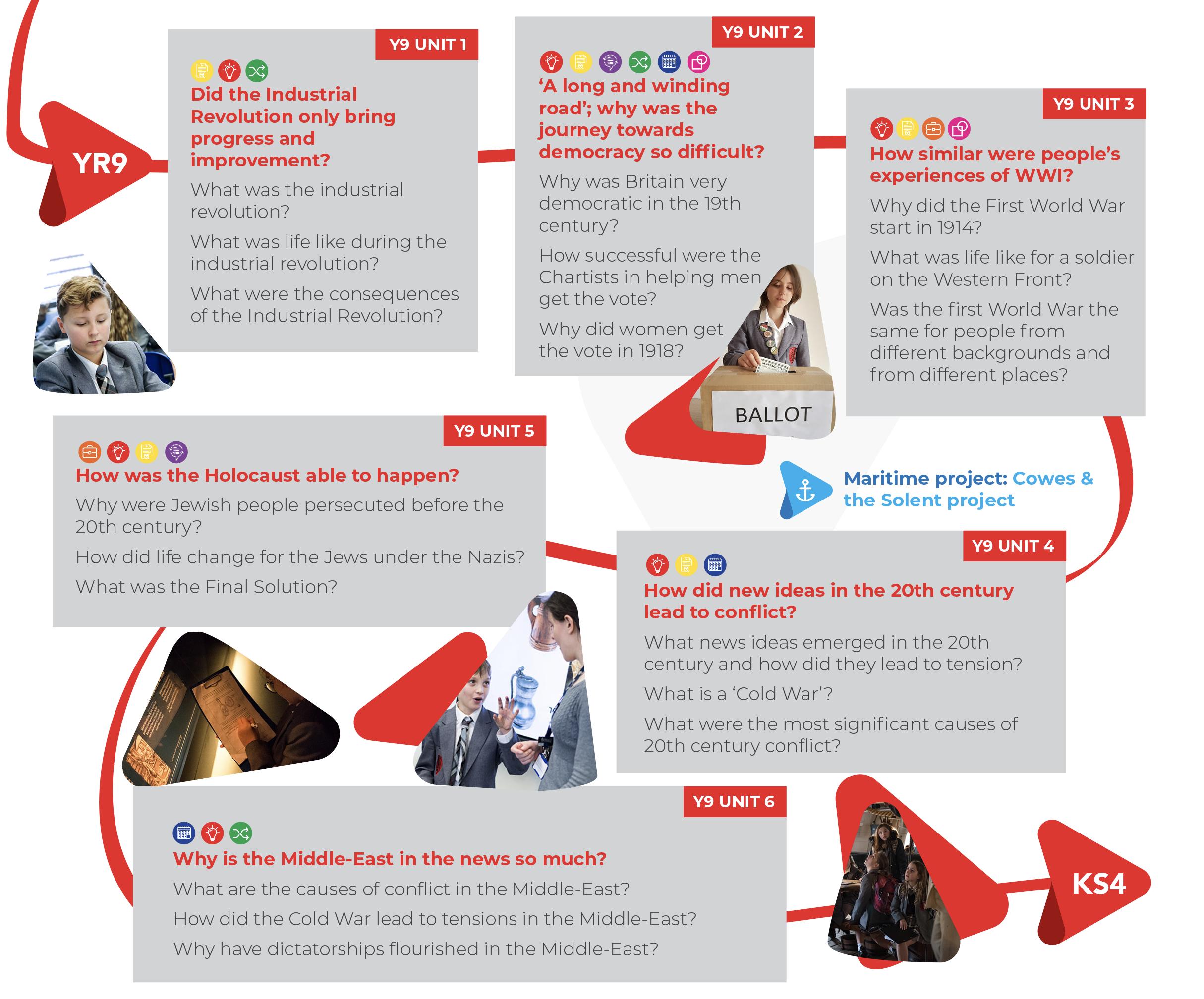
When and how assessment of learning will happen
To assess student progress in History, our year 9 students will complete an in-class assessment at the end of each topic. These will take place at the end of the second, fourth and sixth half-terms. Within each in-class assessment, students will be assessed in three strands:
1. ‘Must know knowledge’. This will be assessed through multiple choice, definition or brief one sentence responses.
2. Disciplinary concepts. This will assess understanding of specific concepts developed through the topic. For example, students could be asked to match up causes to their consequences.
3. Historical skills or writing. This will assess students’ ability to write their own structured accounts, provide an analysis or to use evidence or explore historical interpretations.
In addition, they will complete regular knowledge quizzes to help them develop and recall the key ‘must know knowledge’. These will be set in a combination of in-class and online quizzes. In a 6-week half-term, we would expect students to complete at least 2 quizzes in addition to their in-class assessment.
Reporting
In year 9, you will receive a subject report at the end of each term. In our History subject report you will find:
Useful information about the in-class assessment the students have completed
• A numerical and percentage score from their in-class assessment
• Information and feedback about why a particular score was awarded and an indication of how this could be improved
‘Next steps’ and sources of support to help students improve their performance in the future
• A percentage score from the in-class or online recall quizzes, including feedback about whether they were completed or not
Useful information
Each History report will contain more specific sources of support relevant to each in-class assessment and History topic.
In addition to a paper copy in their exercise books, students will always be able to access the relevant Knowledge Organisers for each History topic online through their History Teams page. This can be accessed via this link (tinyurl. com/bdhkm5hb) or by logging into Office365 using their school login credentials, selecting Microsoft Teams and then searching for Year 8 History in their individual Teams page. All students will also be given a copy of the link via Show My Homework at the beginning of the year.
Our Teams page will also include access to a ‘Read, watch, click’ for each topic. This will give a suggestion of a good book, documentary and website for each topic we study. A copy of our ‘Read, watch, click’ will also be provided via Show My Homework in advance of each History topic.
A really useful general website providing good overviews of most of the topics we study in Year 8 can be www.bbc.co.uk/bitesize/subjects/zk26n39
Homework expectations
In a typical 6 week half term, students would be expected to complete at least three homework activities. These could include online knowledge quizzes, revision and enquiry based activities. Homework will be set via Show My Homework (SMHW).
Cowes Enterprise College | Yr9 Curriculum Information Booklet 2022-23 | 21
History | Year 9 KS3
Maths | Year 9 KS3
Overview
The mathematics curriculum at Cowes is well sequenced which enables all students at all levels of attainment to practise fluency, to reason, and to think mathematically at every possible opportunity.
The curriculum prioritises critical knowledge and gradually builds understanding over time across 3 years. It is underpinned by the principles of cognitive science.
Yr 9 learning journey
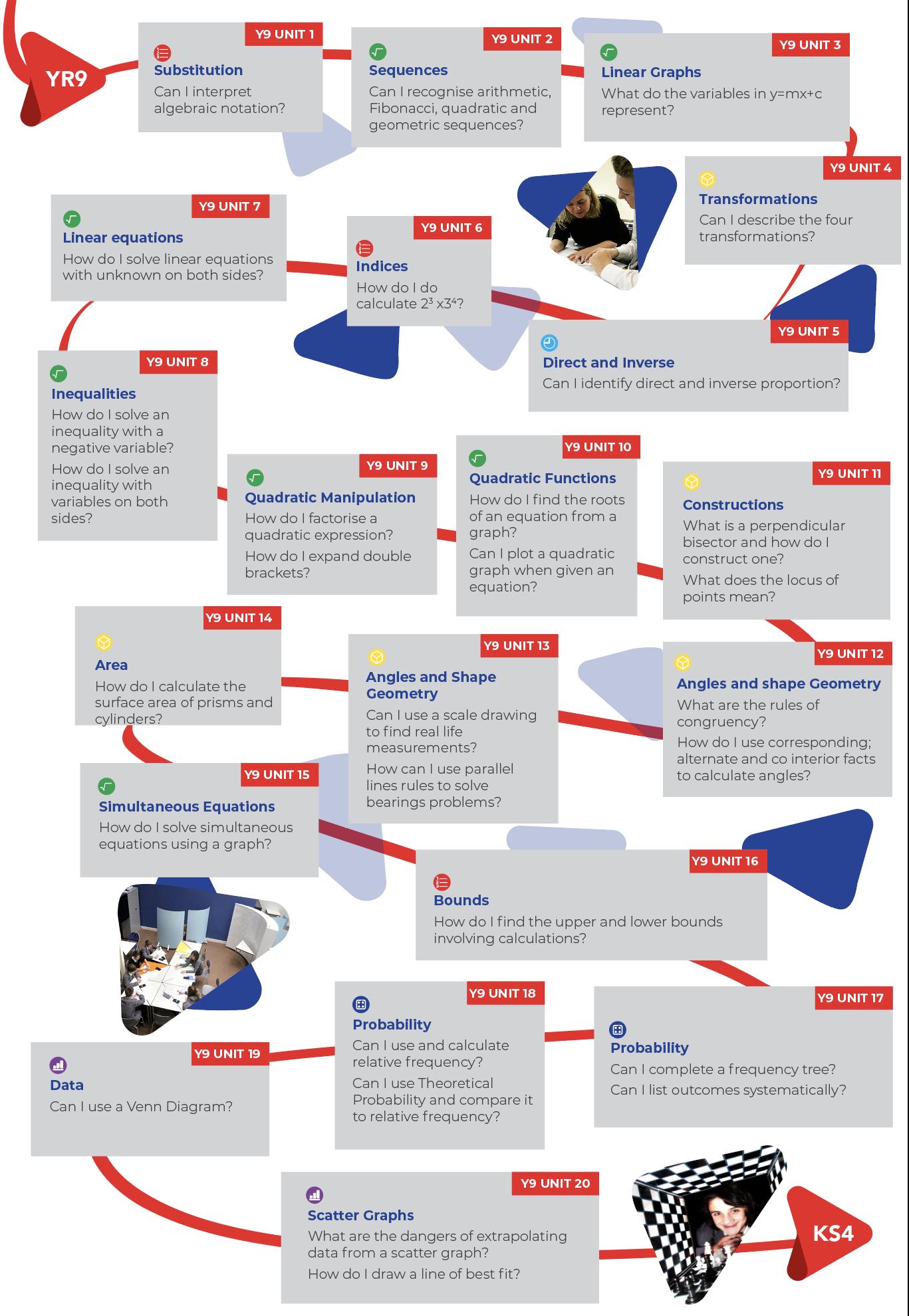
Maths | Year 9 KS3
When and how assessment of learning will happen
There are three formal assessments in year 9, one each term in November, February, and June. Reports based on these assessments will be sent home in December, March, and July. A topic list for each assessment with associated Mathswatch clips to support with revision will be sent out in advance of each assessment through show my homework.
Videos can be found on the video tab and clip numbers typed in the search box. If the clip number is preceded by a letter, it is in the KS3 Qualification dropdown. If the clip number is not preceded by a letter, it will be in the GCSE option.
Above the video, there are options such as interactive questions and a downloadable worksheet. The interactive question option is perfect for students’ independent work. The video will talk about various methods to solve mathematical calculations with opportunities to pause the video so students can answer questions on paper. The videos are helpful to students and parents alike on how to solve mathematical problems.
Useful information
There are plenty helpful and interesting mathematics websites. If you want help on improving your mathematics or just interested in mathematics for mathematics sake the following websites could be of interest.
BBC Bitesize Gives explanations and opportunities for revision on all topics in the maths curriculum
Mr Bartons Revision; Podcast; Maths and Logic Puzzles
Numberphile Video posts about mathematics that explore various topics
Nrich A website with a variety of mathematics problems suitable for all abilities
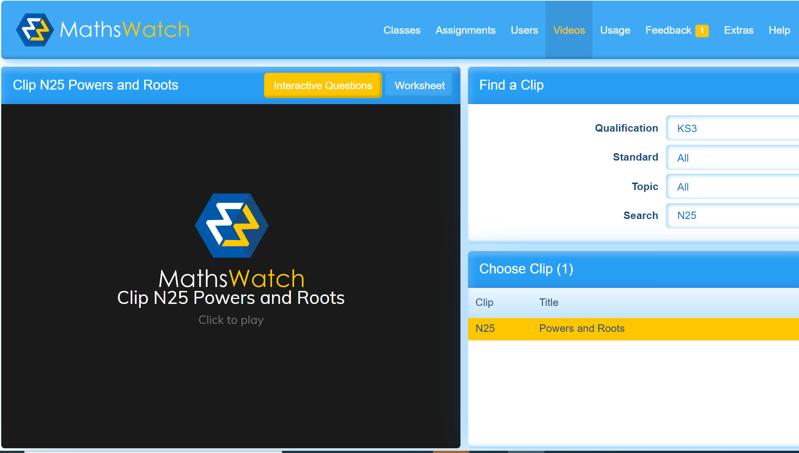
Homework expectations
A main homework will be set weekly by teachers either given in an electronic or paper based format. Homework will typically take 30 to 60 minutes to complete. It is an expectation that all homework is written in the back of exercise books.
As a daily homework students should be encouraged to read or correct their notes the days immediately following their Maths lessons; they are more likely to remember what they have been taught using a “little and often” approach. The only way to remember what you learnt yesterday/last week/last month/last year is to try questions on those topics regularly. Daily homework should be typically 10 to 15 minutes on the day of a maths lesson or the day after.
Cowes Enterprise College | Yr9 Curriculum Information Booklet 2022-23 | 23
Music | Year 9 KS3
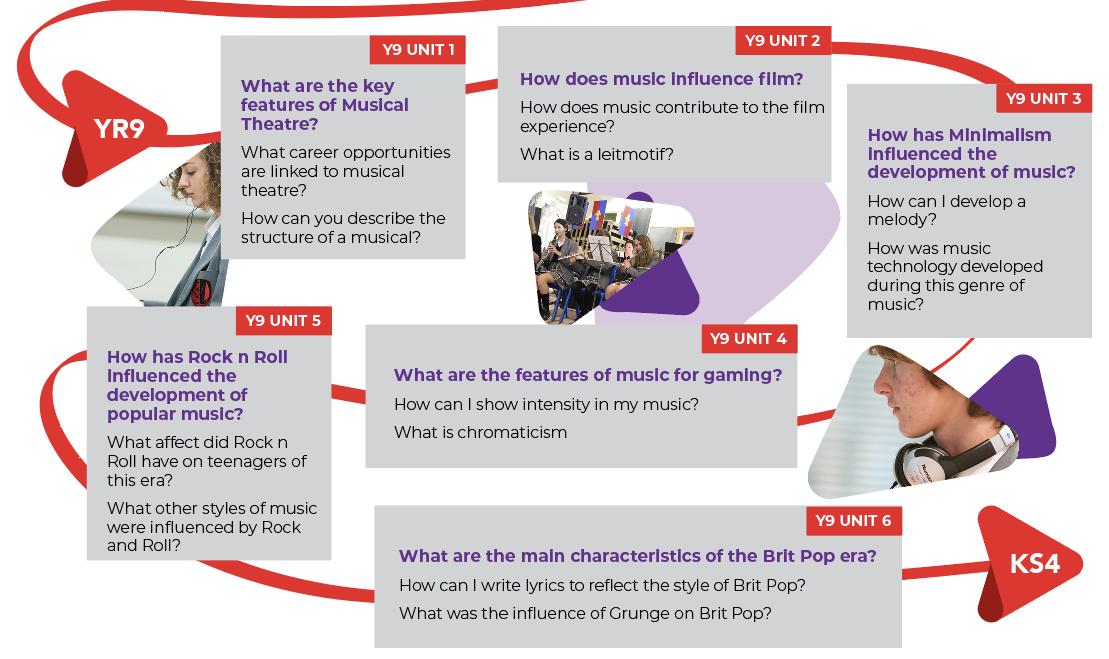
Overview
Students in year 9 will continue to study the musical elements of composition, performance, and expression (singing). This year we are excited to offer our year 9 students an insight into the ever-changing music industry with examples of careers in music relating to the units being studied.
Yr 9 learning journey
When and how assessment of learning will happen
As in year 7 and 8, each unit of work will be accompanied by a Knowledge Organiser. This document contains all of the information we focus on during the unit and then forms part of the end of unit assessment. There will be a quiz set on SMHW which students will complete on the last lesson of each unit. As well as this, students will be assessed on their ‘application of skills’ i.e performance. This will be assessed on two strands.
1. Technical control/accuracy.
2. Expression and interpretation.
24 | Cowes Enterprise College | Yr 9 Curriculum Information Booklet 2022-23
Music | Year 9 KS3
Finally, students complete a self-assessment radar which enables them to evaluate their own progress/ understanding and see where and how they can progress further. An example as follows.
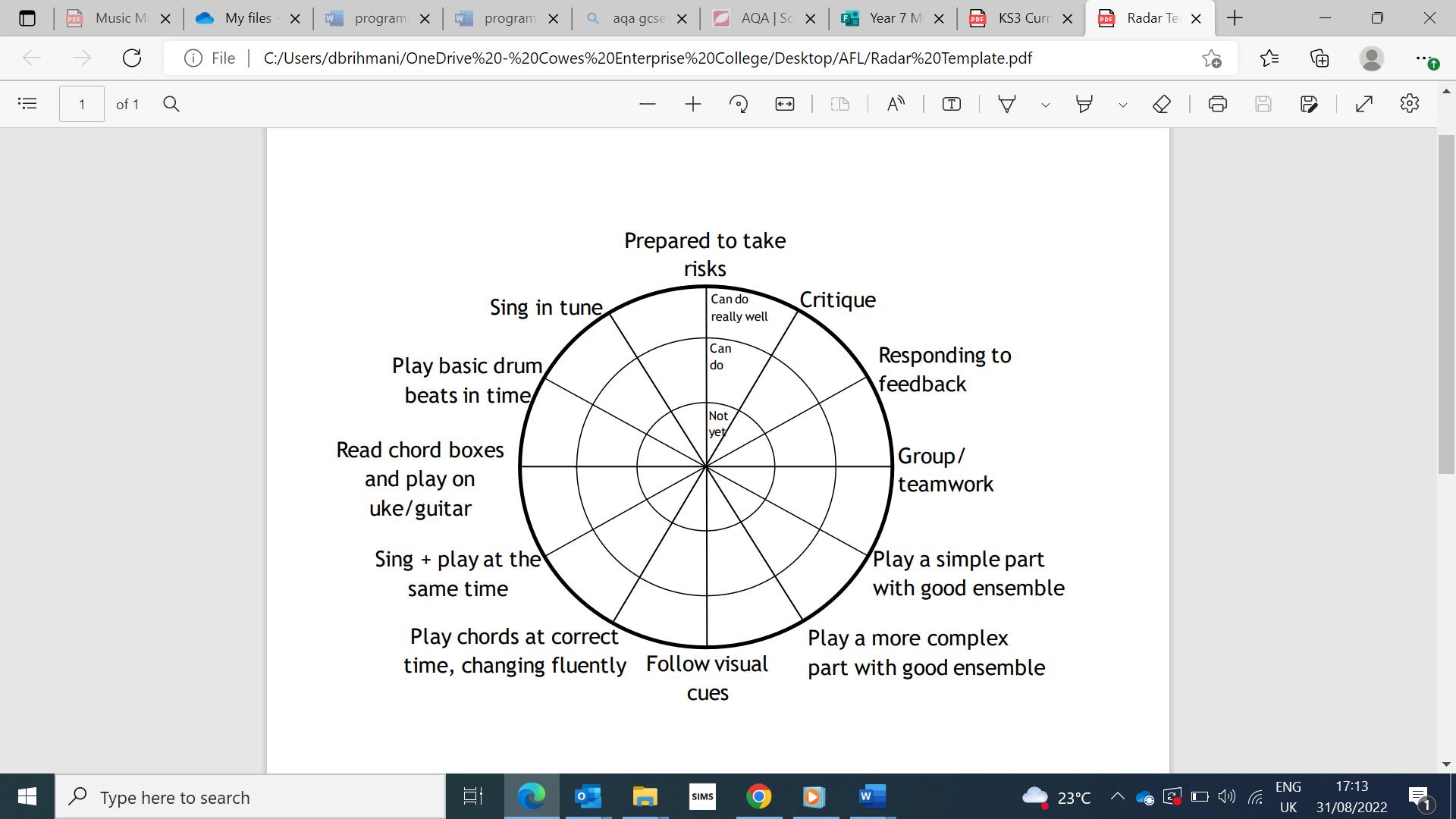
Students will receive a music report twice a year which will again refer to the assessment criteria and offer an overview of their current level of progress and areas for development.
Useful information
To allow our students to appreciate their musical journey with us to the fullest, we encourage them to broaden their musical listening tastes and explore the vast array of music out there. By doing this, students will develop their own taste in music, thus deepening their understanding of genres/styles. Each unit will have suggested listening, however, we do encourage our student’s to explore independently.
To further support our students musical learning, this link will help to develop the aural/theory training. https://www.musicca.com/
We also recommend this free online Digital Audio Workstation (DAW) where students can explore music production, composition, mixing and editing. www.edu.bandlab.com
We actively encourage and advise our students to engage in extra curriculum music. As well as our ensemble opportunity here at Cowes Enterprise College, the IOW also has a wide array of ensembles and groups the students can become involved in. Peripatetic instrumental lessons are also offered. https://iwmt.org.uk/
Nothing encapsulates music better than live performance. Live, online music events can be accessed for free on many occasions. We also like to visit the Portsmouth Guildhall which offers a £1 ticket price for children under 18 for world class orchestral performances. https://portsmouthguildhall.org.uk/whats-on/
Homework expectations
Music homework will be set once every fortnight (3 per unit of work). Homework will be based on revision of the unit’s knowledge organiser and development of practical skills. Homework will not exceed an hour, however, we would like to encourage our student’s to broaden their listening and enjoy keeping a log of listening and practice. Our music staff will be sharing their current listening and we warmly encourage students (and staff) to do the same.
Cowes Enterprise College | Yr9 Curriculum Information Booklet 2022-23 | 25
PE | Year 9 KS3
Overview
Each year in PE students develop knowledge and skills across three main curriculum areas: Skills and Techniques, Tactics and Strategies, and Healthy Participation.
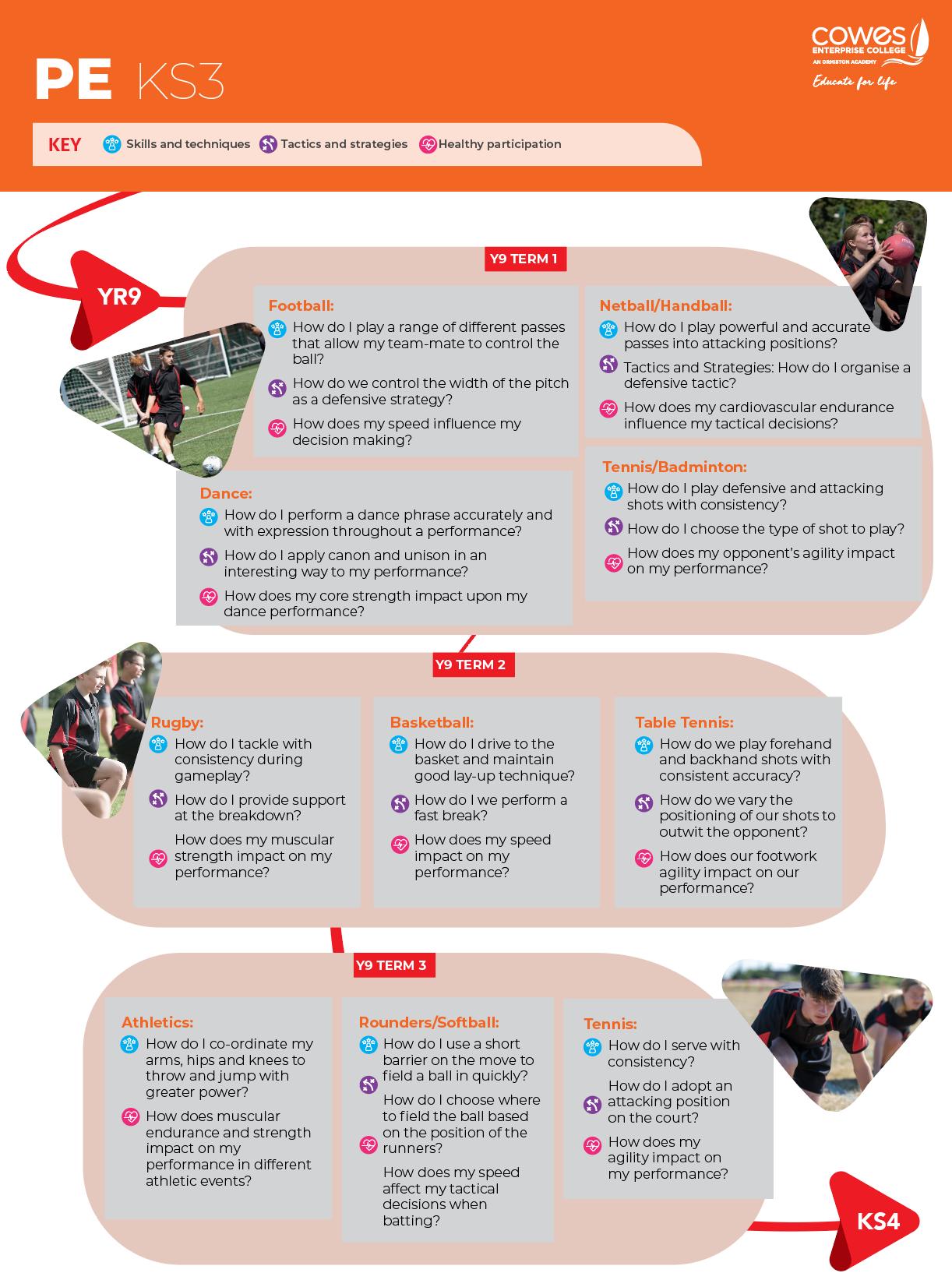
Yr 9 learning journey
The types of activity include:
Fitness - activities where the emphasis is on the individual’s health, fitness, and participation levels.
Invasion games - team game activities where one team play against another, for example, netball, football, and rugby.
Creative activities - these are activities where the focus is on aesthetics and performances as either and individual or group, for example gymnastics and dance.
Athletics - Track and Field events such as sprinting, long-distance running, shot put and high jump.
Strike Field - This includes game events where students play in teams but have individual responsibilities within them, for example rounders and softball.
Net/Wall - these are introduced in year 8 and include racket sports such as tennis and badminton alongside net sports such as volleyball at KS4.
26 | Cowes Enterprise College | Yr 9 Curriculum Information Booklet 2022-23
When and how assessment of learning will happen
Students will work towards bronze, silver and gold levels in the three main assessment areas. These levels are specific to their year group and the type of activity being undertaken. If students are able to perform beyond the gold level, they are awarded the CEC star grade.
For example, the criteria for year 9 invasion games are:
Bronze
Apply key words when talking about rules and regulations. Be able to perform main skills to a competent level and successfully apply a range of tactics during gameplay. Identify some related components of fitness.
Silver Develop leadership roles in skills practices and conditioned games. Secure knowledge of key words. Identify and describe some components of fitness.
Gold Core skills refined to a good level and tactics are used effectively. Able to use feedback to improve own performance. Describe some components of fitness in relation to the sport/activity.
Reports will go home to parents in November, February, and July. These will give information on current attainment and information on how to improve further.
Useful information
Go with or encourage your child to go for a walk, jog or run and record it on the CECrun Share Point page.
Visit the #ThisIsPE page on the AfPE website for ideas on how to get involved with simple exercises at home which can help develop your child’s skills/fitness.
Learn about why PE in school is important:
How exercise affects the brain: https://www.youtube.com/watch?v=E0ARTVoI18U
How playing sports benefits your body ... and your brain: How playing sports benefits your body ... and your brainLeah Lagos and Jaspal Ricky Singh - YouTube
Visit websites such as BBC Sport to read about different sports/fixtures/events with your child:
BBC Sport Cricket: Cricket - BBC Sport
BBC Sport Football: Football - BBC Sport
BBC Sport Netball: Netball - BBC Sport
BBC Sport Rugby: Rugby Union - BBC Sport
BBC Sport Gymnastics:
Dance fact file: Dance - an overview and history of the sport - Dance - factfile - GCSE Physical Education Revision - Edexcel - BBC Bitesize
Watch video clips and learn about the skills and techniques of different sports on the BBC Sports Academy website: BBC SPORT | Sport Academy
Homework expectations
For core PE, homework expectations will be for students to take part in an extra curricular club, event or inter house event each term and to complete a multiple choice assessment in relation to a relevant activity being studied each term. These will be based on rules, regulations and tactical strategies and completed through Show My Homework (SMHW).
School clubs can be found here - Cowes Enterprise College, An Ormiston Academy - School Clubs (cowesec.org)
Cowes Enterprise College | Yr9 Curriculum Information Booklet 2022-23 | 27
PE
| Year 9 KS3
Religious Studies | Year 9 KS3
Overview
Our curriculum in year 9 Religious Studies aims to inspire our students, equipping them with the knowledge and skills to ask and answer challenging questions. Across the Key Stage, students encounter a broad range of different theological, philosophical, and social science approaches, enabling them to ask deep and often searching questions about their own faiths and beliefs, the faiths and beliefs of others regarding pertinent contemporary moral issues.
Yr 9 learning journey
During our year 9 Religious Studies lessons, students will have a big question that leads them into the topic of the lesson, seeking to encourage discussion and debate from the students. They will be taught key ‘must know’ knowledge essential to their deep understanding of the issues we explore.
In Religious Studies, we will cover three different types of knowledge:
• Substantive knowledge – knowledge about various religious and non-religious traditions.
• ‘Ways of knowing’ – where students will learn ‘how to know’ about religion and non-religion.
• Personal knowledge – allowing students to build an awareness of their own presuppositions and values about the religious and non-religious traditions they study.
Through the Key Stage, students will have the opportunity to develop these types of knowledge to make useful connections. The enquiry focus for each topic within our Year 8 curriculum is indicated on our curriculum journey shown above.
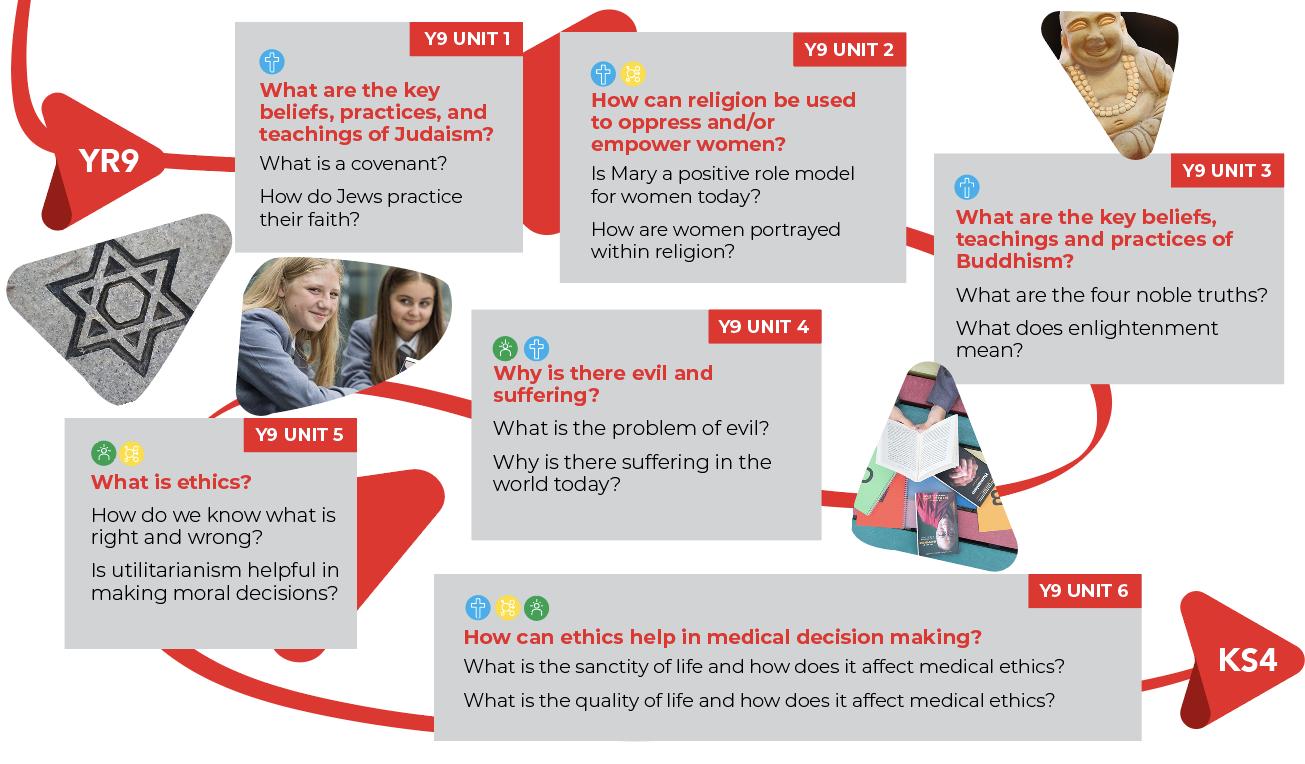
28 | Cowes Enterprise College | Yr 9 Curriculum Information Booklet 2022-23
Religious Studies | Year 9 KS3
When and how assessment of learning will happen
To assess learning in Religious Studies, our Year 9 students will:
Complete an in-class assessment at the end of each topic. These will take place during or at the end of each unit of work. Within each in-class assessment, students will be assessed in two strands.
1. Part A: Requires the students to recall taught knowledge through multiple choice questions.
2. Part B: Requires the students to implement their taught knowledge through a range of different question types including some extended pieces of evaluative writing.
• Each question in the in-class assessment will be worth a set number of marks. The marks available for each question will be based on its complexity. For example, a multiple choice or definition question would be worth one mark, whilst more extended pieces of evaluative writing will be worth 15 marks.
• Complete regular knowledge quizzes to help them develop and recall the key ‘must know knowledge’. These will be set in a combination of in-class and online quizzes. In a 6 week half-term, we would expect students to complete at least 1 quiz in addition to their in-class assessment.
Reporting
You will receive a subject report following each assessment. Currently, this will be during the second and fifth half-terms.
In our Religious Studies subject report you will find:
• Useful information about the in-class assessment the students have completed
A numerical and percentage score from their in-class assessment.
Information and feedback about why a particular score was awarded and an indication of how this could be improved.
• ‘Next steps’ and sources of support to help students improve their performance in the future
A percentage score from the in-class or online recall quizzes, including feedback about whether they were completed or not
Useful information
Students will have access to a wide range of information and support to help them develop their skills as a theologian.
Each Religious Studies unit has a supporting booklet which the students complete during their lesson. This contains the essential information for each lesson and also tasks for the student to complete. At the start of each booklet, for each unit there is a knowledge organiser that contains key information, key vocabulary and key people for the unit. The relevant knowledge organisers will be able to be accessed through their Religious Studies Teams page. This can be accessed via this link tinyurl.com/2p83uwps or by logging into Office365 using their school login credentials, selecting Microsoft Teams and then searching for Year 9 Religious Studies in their individual Teams page.
Homework expectations
Students will be expected to regularly complete homework in Religious Studies. This will consist of knowledge recall tasks linked to their learning across the breadth of the topic or enquiry based activities and further research. Homework will be set once a fortnight via Show My Homework (SMHW).
Cowes Enterprise College | Yr9 Curriculum Information Booklet 2022-23 | 29
Science | Year 9 KS3
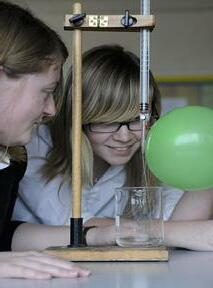
Overview
Our curriculum in year 9 aims to add further depth to the concepts first encountered in year 7 and 8 and demonstrate to prepare students for the transition to GCSE study in the subject. This is still achieved through our organisation of the curriculum into the overarching topics of organisms, ecosystems, genes, matter, earth and beyond, reactions, energy, waves and forces. These topics are revisited regularly throughout KS3, and they progress into KS4 as well, and regularly recap the key pieces of content delivered in year 7 and 8.
Alongside the factual (substantive) knowledge, students will also be taught the key disciplinary concepts which make up Science as a subject. Across year 9, students will develop their understanding of:
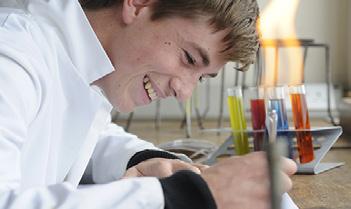
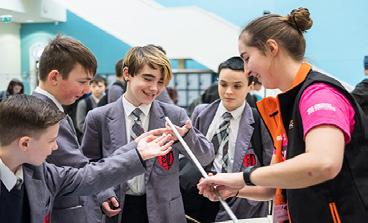
Biology
Chemistry
What is diffusion? How do humans breathe? What is DNA? How are traits inherited? What is an ecosystem? How is a food web laid out?
What is a difference between acids and alkalis? How can you measure whether a substance is acidic or alkaline? What is the difference between an element and a compound? How are all known elements displayed? What are exothermic and endothermic reactions? How do reaction profiles show energy change in a reaction? What is the Big Bang theory? How have we used telescopes to detect planets? What is the Dalton model of the atom? How does the Bohn model of the atom differ from the Dalton one?
Physics What happens when forces are unbalanced? How is speed calculated? What is radiation? How are electromagnetic waves used? What is friction? How can you measure the stretching of a spring?
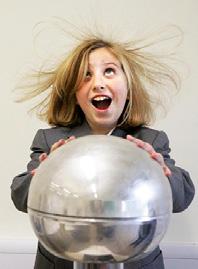
YR9 KS4
KEY Biology Chemistry Physics Maritime Cross curricular Cell level systems What are the differences between a light and electron microscope? How do enzymes speed up reactions? Y9 UNIT 12 Using the atom How are particles arranged in an atom? How are Rf values calculated in chromatography? Changes of state What is specific heat capacity? How does an increase in temperature affect pressure of a gas? Y9 UNIT 13 Monitoring motion What is the difference between speed and velocity? How can you measure acceleration? Y9 UNIT 15 Motion What happens when forces are unbalanced? How is speed calculated? Y9 UNIT 1 Acids and alkalis What is a difference between acids and alkalis? How can you measure whether a substance is acidic or alkaline? Y9 UNIT 2 Gas Exchange What is diffusion? How do humans breathe? Y9 UNIT 3 Elements and compounds What is the difference between an element and a compound? How are all known elements displayed? Y9 UNIT 4 Radiation and electromagnetic waves What is radiation? How are electromagnetic waves used? Y9 UNIT 5 Inheritance What is DNA? How are traits inherited? Y9 UNIT 6 Models of the Universe What is the Big Bang theory? How have we used telescopes to detect planets? Y9 UNIT 7 Interdependence What is an ecosystem? How is a food web laid out? Y9 UNIT 8 What are exothermic and endothermic reactions? How do reaction profiles show energy change in a reaction? Y9 UNIT 9 Periodic table development What is the Dalton model of the atom? How does the Bohn model of the atom differ from the Dalton one? Y9 UNIT 10 Contact forces What is friction? How can you measure the stretching of a spring? Y9 UNIT 11 Y9 UNIT 14
Science KS3
Throughout the Key Stage, students will have the opportunity to develop these disciplinary concepts to make connections, analyse different examples of the material taught, carry out practical work having determined the variables, as well as carrying out mathematical processes such as graphing and calculation of values. Students will also be able to explore how scientific evidence is used and generate their own conclusions from experimental data. Students will become confident when using key scientific terminology in their writing.
When and how assessment of learning will happen
To assess student progress in Science, our year 9 students will complete:
• an in-class, self-assessed learning quiz at the end of each topic followed up with improvement tasks completed in class to ensure students are developing their understanding.
• an extended writing task based on the mini-topic being delivered which will be marked in the student’s books, and will generate an improvement target for the students to be completed in their books.
formal assessments in December and April. The December mid-year assessment covers the topics delivered in the first half of the academic year. The terminal year 9 assessment in April covers the second half of the year in addition to recall of the key content from the first half. These assessments will be marked by teachers and will lead to science reports being sent home.
In our Science subject report you will find:
• Information about the in-class assessment the students have completed A numerical and percentage score from their in-class assessment. A progress comment for each of the topics included in the assessment.
• ‘Next steps’ and sources of support to help students improve their performance in the future based on the assessment.
• Links to knowledge organisers to help develop the areas most in need.
Useful information
Students will have access to a wide range of information and support to help them develop their science skills. Each Science report will contain more specific sources of support relevant to each in-class assessment, such as links to relevant online revision tools and access to the knowledge organisers.
In addition to a paper copy in their exercise books, students will always be able to access the relevant knowledge organisers for each Science topic online through the school website. All students will also be given a copy of the relevant topic knowledge organiser on Show My Homework (SMHW) to aid them working on the topic out of lesson, and to further the possibility of specific support being given at home.
Knowledge organisers are concise and precise overviews of the must know knowledge needed for each topic. They also contain the key subject specific vocabulary relevant for each topic.
A really useful general website providing good overviews of most of the topics we study in Year 8 can be found at BBC Bitesize https://www.bbc.co.uk/bitesize/subjects/zng4d2p
Homework expectations
Each topic will have the knowledge organiser set for home learning of the key content and the key terms. The students will also have an online Show My Homework (SMHW) quiz for the topic. This will be repeated in each topic (approximately 2 weeks).
Cowes Enterprise College | Yr9 Curriculum Information Booklet 2022-23 | 31
Science | Year 9 KS3
Overview
Year 9 is a key transitional year in MFL in which students are taught to consolidate and apply their invaluable knowledge from year 7 and 8 to a greater depth on familiar and new topics. These new topics will challenge their thinking about the world around them, such as their use of technology and the media, the world of work, healthy lifestyles and a broader awareness of the cultural celebrations of the target language country. The focus is also for students to gain a mastery of the core vocabulary and grammatical skills that will underpin their learning at GCSE. Students are expected to apply their fundamental building blocks of knowledge to greater depth and detail. There is a focus in year 9 on students honing their written communication skills with an expectation that their knowledge is robust enough to now develop their oracy, unconsciously applying their knowledge as skills. The five topics covered are shown below.
Yr 9 learning journey
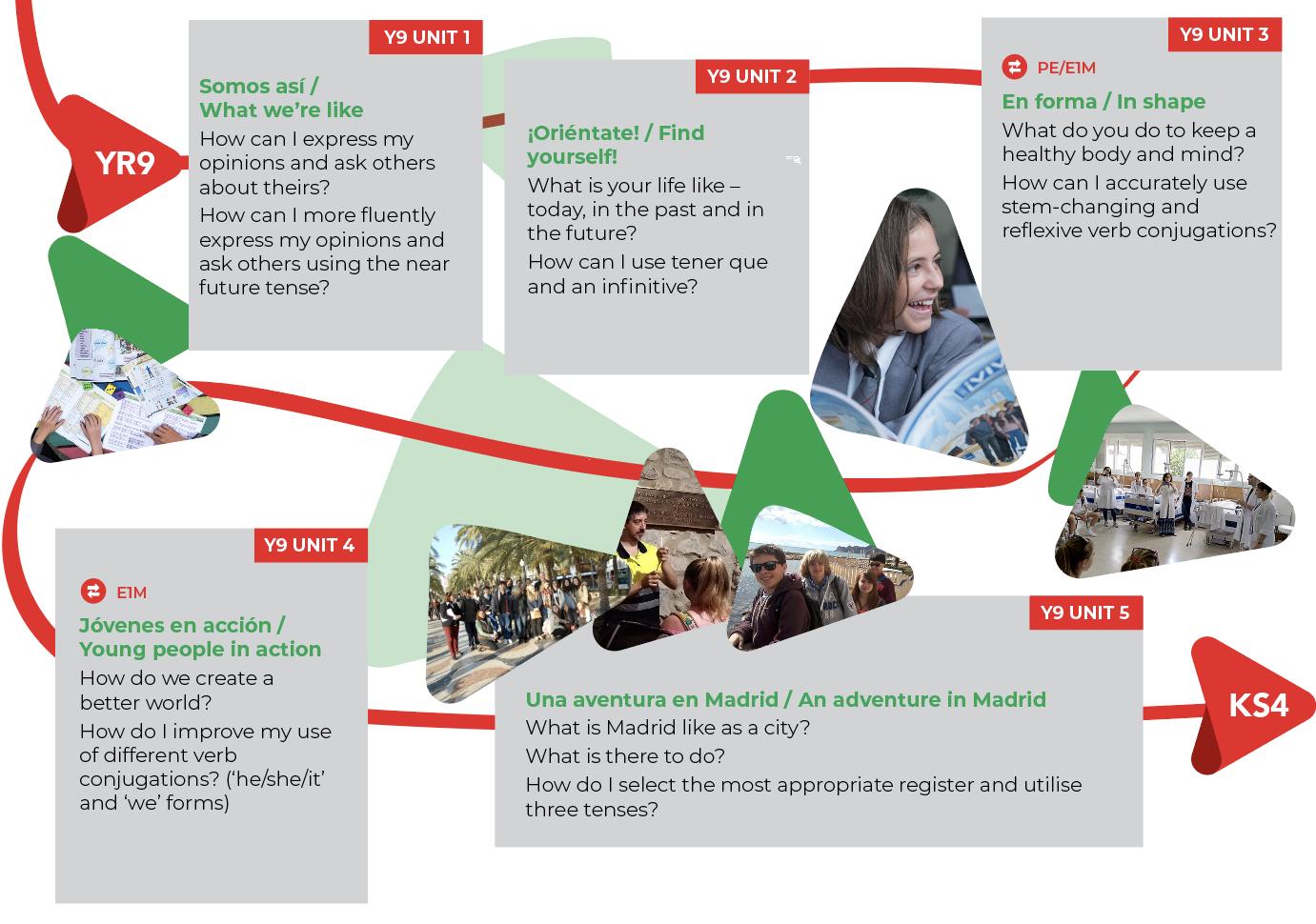
32 | Cowes Enterprise College | Yr 9 Curriculum Information Booklet 2022-23
Spanish | Year 9 KS3
When and how assessment of learning will happen
What we’re like – discussing likes/dislikes
How skills are assessed
Listening
Speaking
Reading
Writing
Students will show that they can understand the main points of short, spoken texts as well as longer texts on each topic, including reference to future and past events.
Students will demonstrate that they can accurately pronounce the majority of vocabulary from the Y9 curriculum. Students will have short conversations about the topics studied. They will use the present, past and future tenses.
Students will demonstrate their understanding of main points, opinions and details in short and longer written texts, including reference to future and past events.
Students will aim to write texts using language from memory, giving opinions with reasons, using time expressions, sequencers, frequency expressions and referring to present, past and future events.
Useful information
Vocabulary learning is vital for language acquisition. Please try some of these…
• Use “Look-cover-write-check” or “Look-cover-say-check” strategy for revision for speaking and writing tests
• Play games with your child to learn the vocabulary – use the links for the online resource “blooket” given each week on SMHW
• Sticky notes: Ask your child to write new vocabulary on sticky notes and stick them where he/she will see them often. For example, he/she could stick them to the bathroom mirror to read through every time he/she washes their hands or brushes his/her teeth
• Make cards: Cut up some paper or card into small rectangles. Write one target language word on each card. Write out the English words too, one word per card. Mix them up and match the cards! You can play snap with them or turn them all upside down and try to find the pairs.
Use languages online link below to help your child learn the necessary grammar
• https://www.languagesonline.org.uk/Hotpotatoes/spanishindex.html#Grammar
Homework expectations
Each Friday, a link to “quizlet” and “blooket” will be provided on Show My Homework (SMHW) for your child to start learning the key vocabulary for the unit to be taught the following week. Encourage your child to review the vocabulary on their preferred site (you will need to help them make an account using their school email). Ideally, your child should spend 10 minutes per day reviewing the vocabulary and at the end of the week, they should complete either the spelling test or vocabulary quiz (or both!) on Show My Homework (SMHW) to show their teacher they have retained the vocabulary. This is due every Friday. If you require a paper copy of the key vocabulary, please email your child’s class teacher or info@cowesec.org Students will be expected to thoroughly prepare for speaking and writing tests.
Cowes Enterprise College | Yr9 Curriculum Information Booklet 2022-23 | 33
Topic Assessment Focus When
Listening /Speaking End of half term 1
Reading / Writing End of half term 2
shape – Healthy and unhealthy lifestyles Listening /Speaking End of half term 3
people in
– My rights and the environment Reading / Writing End of half term 4
in
– Talking
past experiences Listening /Speaking End of half term 6
Find yourself! – discussing your life in the past/present/ future
In
Young
action
An adventure
Madrid
about
Spanish | Year 9 KS3
Overview
Y8 MARITIME
Geography
How does the importance of containerisation effect our economy and its role within the shipping industry?
Students learn through their county study of China and how shipping routes interconnect countries globally.
Technology in action visit to CECAMM: Rescue at sea
Food, preparation and nutrition
How can I prepare and cook food using a hob and oven in a confined space to produce a well made and nutritious food product?
How can I ensure that the food a produce meets the dietary requirements of a multicultural crew?
Y8 MARITIME
Textiles
How can I safely operate a sewing machine to product a beach bag?
Maritime Construction: Students visit CECAMM (Centre of Excellence for Composites, Advanced Manufacturing and Marine) and engage the three tasks involving maritime engine construction, composites and casting. Students use already cured components, and create a vacuum bag to learn how these components were created. They then have the opportunity to vacuum test their layup to see how well it held the vacuum. They will also explore careers opportunities relating to composites and construction.
Year 9 learning journey
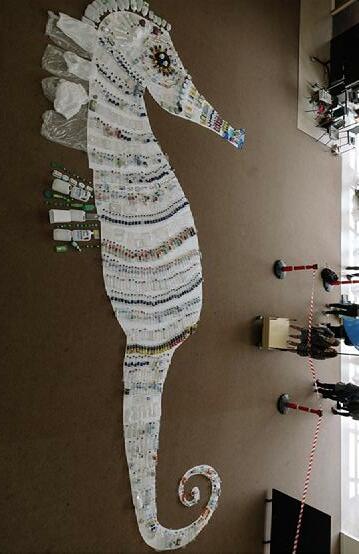
YR9
Science
How do toxins affect aquatic organisms?
How are genetically engineered fish used to detect pollution? How do invasive plant species affect marine ecosystems?
Y9 MARITIME
Science
How can the strength of rope be investigated?
How can stiffness of material be investigated?
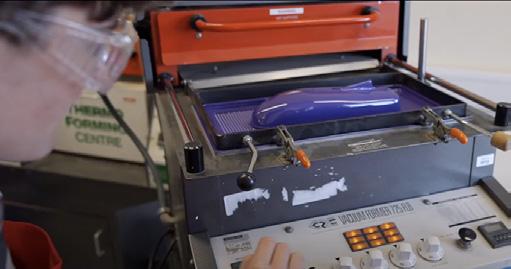
How can friction be investigated?
How can stretching be investigated?
Design and Technology
Students learn about different careers within the maritime clothing industry
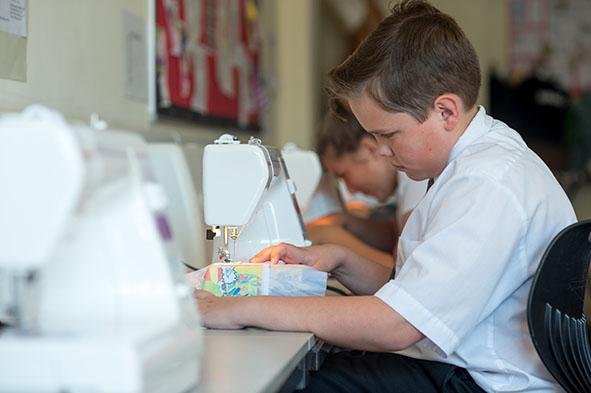
Y8 MARITIME
Science
Every student in years 7, 8 and 9 studies and is exposed to our Maritime Futures Curriculum. The theme of maritime is not a discrete subject but is woven through traditional curriculum subjects to support students’ conceptual understanding using practical projects and experiences. This is also supported by local maritime experts who work with our students as mentors and advisors to bridge the gap between school and industry. Students have access to a careers portal that features video interviews from a range of maritime employers who discuss how different subjects studied can create pathways to a huge range of employment opportunities within the industry.
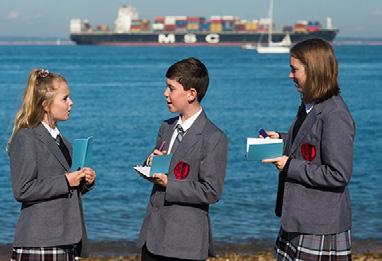
What are composites and how are they used?
How are polymers used in maritime?
How is magnetism used in navigation?
Geography
Y9 MARITIME
How is our physical landscape changing with different forms of renewable energy. Students study the economical impact of renewable energy, the long-term importance and sustainability.
Technology in action visit to CECAMM: Rescue at sea
Maritime Construction: Students visit CECAMM (Centre of Excellence for Composites, Advanced Manufacturing and Marine) and engage in three activities involving advances electronics, destructive testing and virtual welding. They will be introduced to the LIVE AIS picture that shows the buoys and the activity that they are controlling. They will go on to consider the sequencing of geometric patterns required in the electronic circuit. Students will choose resistor and capacitor values and teste their end product to reflect upon the choices made.
How can I apply and use my knowledge of sailboat and motor boat production to complete an independent maritime design challenge? What shape of sea-going vessel responds better in different sea conditions?
How can I use my knowledge of industry standard manufacturing techniques and the properties of materials to build an efficient hull and rig?
Students apply knowledge gained from science lessons on the strength of ropes and sheets alongside their Year 7 and 8 knowledge of efficient hull design to meet a design brief
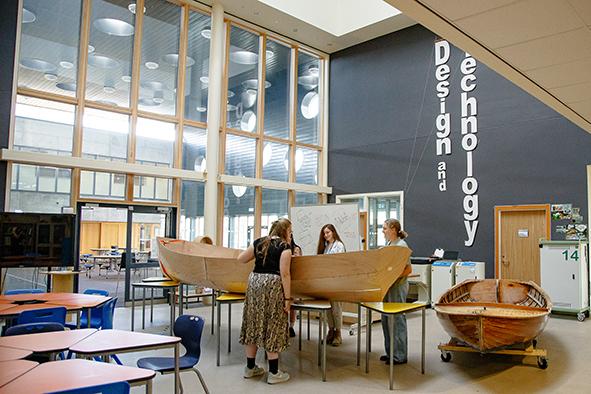
Geography
Y9 MARITIME
How are coastal communities being impacted by climate change and what is the risk to these populations?
Y9
Art
Biosphere project: Painting, 3D and screen printing.
What is the impact on coral reefs by the rising of sea temperatures?
Why does the Island have a biosphere status?
What causes coral reef bleaching?
How do artists raise awareness of threats to marine eco-systems?
Geography
How is maritime exploration in the arctic affecting the wealth international trade? Students study the exploration of oil sources in the arctic and consider the response to changes in the North West Passage and concerns about energy security.
Textiles
Beachwear: How can I use a sewing machine to create and open seam?
Weather: How can I use shape, pattern and understanding of wind flow to produce a windsock?
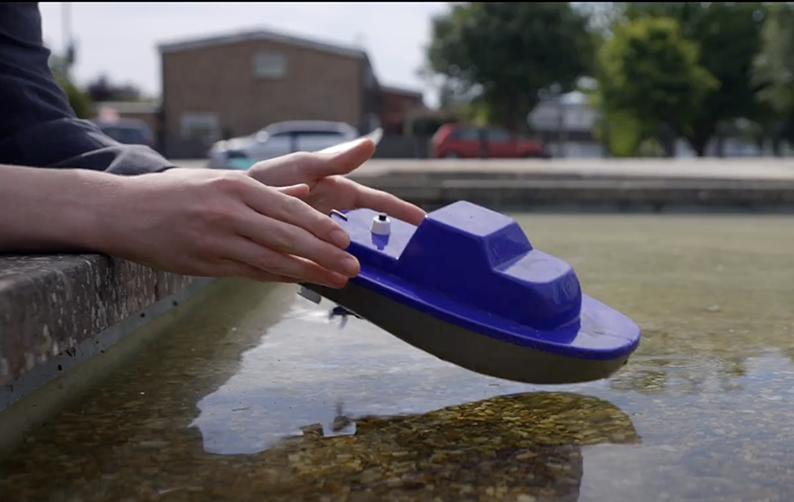
Students learn about careers within the maritime industry are linked to sailcloth, safety clothing and fashion.
KS4
34 | Cowes Enterprise College | Yr 9 Curriculum Information Booklet 2022-23
Y8 MARITIME
MARITIME
Y9 MARITIME
Y9 MARITIME
Y9 MARITIME
Maritime | Year 9 KS3
Maritime | Year 9 KS3
Throughout the year, students in year 9 will continue their maritime journey in design and technology by investigating the way specific elements of a vessel are constructed to withstand different external pressures. Through trial and improvement coupled with using Computer Aided Design, in groups they will also build a model boat the combines their skills from both years 7 and 9. As part of their technology rotation, they will also learn how to produce a one-pot meal in food, preparation and nutrition. The production of the dish takes into considering different ways the maritime industry caters for a variation of cultural dietary requirements and how ingredients can be kept fresh for longer periods of time.
Through art, students will contribute to the KS3 Biosphere Project with a focus on sustainability. Their work will then be displayed in an exhibition open to other students to observe and enjoy.
Half way through Year 9, the whole year group will have the opportunity to spend a day at CECAMM in East Cowes (Centre of Excellence for Composites, Advanced Manufacturing and Marine). They engage in a carousel of practical activities including virtual welding, using industry standard machinery such as lathes and mills and also learn how a CNC (Computer Numerical Control) machine is programmed.
At the end the academic year, students present their maritime work in a showcase event as well as having the opportunity to test their sailboat designs on water.
When and how assessment of learning will happen
Students will be assessed on their application of skills within the maritime unit of a subject. A knowledge organiser will also be provided that provides explanations to key vocabulary as well as examples and ideas to support their projects. Assessment will also take the form of formative assessment with students being given opportunities to respond to questions to challenge their understanding.
Useful information
Discuss your child’s maritime studies with them and talk about how the maritime industry has a vast range of employment opportunities from Naval Architecture (designing boats) to robotic engineers.
Cowes Enterprise College also runs a weekly boat building club where students work alongside technicians to learn about design and restoration through practical application.
Our OAT Futures webpage gives you an opportunity to listen to employers and employees discussing their job role and how their studies took them to their position – some of whom are ex-students from CEC.
Please visit: https://oatfutures.co.uk
Cowes Enterprise College | Yr9 Curriculum Information Booklet 2022-23 | 35
Interesting Podcasts for those looking for a little bit extra….
General
Ted Talks Daily: every weekday, this brings you the latest talks on thought-provoking ideas on every subject imaginable
Talks by brilliant kids and teens (Ted Talks): talks from scientists, musicians, innovators, activists -- all under the age of 20
Stuff you should know: an award-winning source of unbiased, reliable, easy-to-understand answers and explanations of how the world actually works
Part time Genius: for teens who love asking absurd questions, this podcast may just have the answers
What’s Good Games: an upbeat show for the nerdinclined and your source for video game news, analysis, commentary and funny stuff
Talks at Google: brings the world’s most influential thinkers, creators, makers, and doers all to one place
How to Fail: a podcast that celebrates the things that haven’t gone right. Every week, a new interviewee explores what their failures taught them about how to succeed better
Current Affairs
Wait, Wait Don’t Tell me: weekly news quiz. Have a laugh and test your knowledge with today’s funniest comedians
The Daily: The biggest world stories of our time, told by the journalists from the New York Times. Twenty minutes a day, five days a week, ready by 6 a.m.
Business/IT
How I Built This: a podcast about innovators, entrepreneurs, idealists, told by the founders of some of the world’s best known companies and brands
Foundering: an award winning podcast which brings you inside different high stakes drama from the technology industry
English
The Moth: Moth storytellers stand alone, under a spotlight, with only a microphone and a roomful of strangers. It’s a great listen for anyone interested in writing or storytelling
Live from Mount Olympus: combines contemporary theatre with the storytelling of Greek mythology. The first season retells the story of Perseus, who makes a vow to slay the Gorgon Medusa and bring back her head
The Unexplainable Disappearance of Mars Patel: a high-quality serial mystery. Think Goonies, meets Spy Kids, meets Stranger Things for up to 13 year-olds
Welcome to Night Vale: a quirky twice-monthly mystery podcast in the style of community updates for the fictional small desert town of Night Vale, reporting on the strange events that occur within it
Novel Pairings: a podcast “dedicated to making the classics readable, relevant, and fun”
Something Rhymes with Purple: Susie Dent and Gyles Brandreth invite you to enhance your vocabulary, uncover the hidden origins of language and share their love of words in this award-winning podcast
Word of Mouth: Poet Michael Rosen explores the world of words and the ways in which we use them
History
Stuff you missed in history class: History is full of weird, wonderful stories that are often glossed over in academic settings. This podcast uncovers some of those incidents.
You’re dead to me: the comedy podcast that takes history seriously. Greg Jenner brings together the best names in comedy and history to learn and laugh about the past
We are History: the less than serious history podcast
Dan Snow’s History hit: the most exciting and important things that have ever happened on the planet!
History Extra Podcast: the latest news from the team behind BBC History Magazine
The Rest is History: interrogates the past and attempts to de-tangle the present as a result
Science/Maths
The Curious Cases of Rutherford and Fry: science sleuths Dr Adam Rutherford and Dr Hannah Fry investigate everyday mysteries sent by listeners
The Infinite Monkey Cage: a witty look at the world through scientists’ eyes
Radiolab: the hosts break down scientific concepts to make them accessible
Science Friday: a podcast for science lovers which focuses on current events, and the scientific concepts that are in the news
Science(ish): delves into the science behind popular culture
36 | Cowes Enterprise College | Yr 9 Curriculum Information Booklet 2022-23
Interesting Podcasts for those looking for a little bit extra….
Eureka! a show that gets under the skin of science with questions that really matter!
30 Animals that Made us Smarter: amazing things humans have learnt from the animal kingdom
Drama
The Hamilcast: a Hamilton Podcast: if you’re a fan of the world-famous musical or simply want to know about this cultural phenomenon, this podcast is just the thing for you
Backstage with Disney Theatrical: if you’ve ever wondered what goes on behind the scenes of your favourite Disney shows, this podcast reveals all #SuchStuff from Shakespeare’s Globe: the hosts take you behind the scenes, into rehearsal rooms and onto Shakespeare’s Globe’s stages, sharing the incredible stories and experiences that come through their doors every day
Art
ArtCurious: think art history is boring? Think again. It’s weird, funny, mysterious and liberating. Who is Banksy, really? Did Van Gogh actually kill himself?
The Lonely Palette: in each episode Tamar picks a painting and interviews unsuspecting museum visitors about it
DT
99% Invisible: a tiny radio show about design, architecture & the ninety-nine percent invisible activity that shapes our world
Wellbeing / Teen Advice/ Careers
Mental Music: this is a podcast made for and by teens, focusing on mental health
Adult ISH: for older teens who are soon to be headed into the real world
Dear Hank and John: the brothers answer questions like how to quit a job, how to find time to do little things, and can bees feel happiness and sadness
Mentors 4 Teens: a careers podcast which brings in young successful mentors in a variety of industries who will give actionable tips and advice on how they got there and how a teenager can get there too
The Happiness Lab with Dr Laurie Santos: based on her Yale psychology course Laurie will change the way you think about happiness
Freakonomics Radio: tells you things you always thought you knew (but didn’t) and things you never thought you wanted to know (but do)
How do you cope?: the hosts talk to a range of guests about the challenges and hurdles they’ve faced in their own lives
Music
Song Exploder: where musicians take apart their songs, and piece by piece, tell the story of how they were made Switched on Pop: this podcast analyses the popular songs and artists that are in the music industry
Black Girl Songbook: a deep dive into a different Black woman in the music industry each week
Geography
Andy Steves Travel: from a life raised on travel, Andy Steves connects with global friends in seeking out the ultimate tips, tricks and tales of life abroad
Family Adventures: inspiring interviews with families who have dreamed big and experienced epic adventures
National Geographic Weekend: a weekly talk show featuring interviews with some of the most fascinating explorers and scientists on the planet
80 Days; An exploration Podcast: a podcast dedicated to exploring little-known countries, territories settlements and cities around the world
Ask the Geographer: a podcast by Royal Geographical Society Schools
Kid Friendly Geographer Fun Facts Podcast: weekly geography fun facts for kids and parents to enjoy together
RS and Philosophy
The Philosopher’s Zone: the simplest questions often have the most complex answers. The Philosopher’s Zone is your guide through the strange paths of logic and ethics
The Philosopher’s Arms: Matthew Sweet examines philosophical problems with a live audience in a pub
Cowes Enterprise College | Yr9 Curriculum Information Booklet 2022-23 | 37
Reporting Schedule | Year 9
Parents’ Evening Dates
Parent and Subject Teacher Evening
Year 9 Reporting Schedule
The table below gives an overview of which subjects will be sending reports home during each half term of the school year. Reports will be sent home at different times during the half term, depending on when the assessment has taken place. Following a formal assessment, teachers will mark and moderate work before entering data to generate the reports. Once this has been checked, the reports will be sent home.
38 | Cowes Enterprise College | Yr 9 Curriculum Information Booklet 2022-23
Wednesday 16th November 2022
Autumn Term Half Term 2 Nov - Dec English PE DT Rotation 1 History Geography RS Drama Maths Spring Term
Term 3 Jan - Feb DT Rotation 1 Science French/Spanish Music Art Half Term 4 Feb - Mar Geography PE French/Spanish History Maths Geography Summer Term Half Term 5 Apr - May English Music Science Drama RS DT Rotation 2 Half Term 6 Jun - Jul Art PE Geography History DT Rotation 3 Maths English French/Spanish
Half
Cowes Enterprise College | Yr9 Curriculum Information Booklet 2022-23 | 39
